#she likes that her background in linguistics means that she can make all sorts of people more comfortable just by talking to them
Text
i love finding old fanfic ideas in my notes app
#old like i think i wrote this one around this time last year#it's basically EMT!Robin doing a first aid demonstration at a high school#and there's a bit where everyone can ask questions about being an EMT and all that#and robin talks about how her actual dream was to study linguistics and maybe go into translating or teaching#so someone asks what made her change her mind and she talks about how her best friend (steve obvs) saved a life once#and after that realised /that/ was what he was good at and they made all these plans and he started going to school for it#and then he died. and for awhile it was the only thing that made her feel close to him again so she went into the course for him#and years later it's something she actually weirdly enjoys - if only for the routine of it all#she likes that her background in linguistics means that she can make all sorts of people more comfortable just by talking to them#she still doesnt have the stomach for it the way steve always had though - it's supposed to be a buckingham fic sorta#so eventually she was going to meet chrissy and they were going to get close and chrissy was gonna like. inspire robin to follow her dream#idk i have a couple 'robin lives' fics where she has to deal with the fallout of steve dying when vecna comes back
17 notes
·
View notes
Text
Across Lands and Seas

( Reposted from @armands-sanctum )
Summary: Headcanons for Hobie Brown and Afro-Latine!Reader
Author's Notes: More like an analysis on colonization with Hobie in it im sorry....
CW: political language and ideas, mentions of white supremacy, mentions of racial hierarchies.
Masterlist
I talked a bit with ellie anon about this, and this is for them so <3
Hobie is a culturally literate man, he absorbs history like a sponge, constantly learning and engaging with new material that intrigues him about things he already knows or new information brought to him, that being said I think that Hobie is extremely culturally intelligent ESPECIALLY as a black man, there is no room for arguments about colorism, or privilege around him, and he shuts down someone with vile opinions quickly.
“Mate you don’t really know what you’re talking about yeah?”
Hobie with an Afro Latine significant other is like having a living encyclopedia, he knows so much not just from what he’s read but lived experience with people in his communities.
If you’re estranged from your culture due to the diaspora and colonization Hobie make it his personal goal to help you build a found family with the Afro Latinxs in his punk circles, taking you to festivals and markets with them, they excitedly talk about their country specific dishes, who makes the better variants of food, linguistic similarities between each other, conversations about gender expression within each country and how indigenous beliefs shaped the land and it’s people even when colonization has deemed them eradicated and nonexistent.
You know how people say “Show me your friends and it’ll show me who you are”? Hobie is that kind of person, he holds his friends in high regard and holds them to standards he knows they are capable of, his Latino friends are amazing, they hold no judgement if you can’t speak Spanish, reminding you that the language was enforced on you all as a means of control and to diminish the histories of the indigenous tribes who lived in tandem with the earth, they are all gender diverse, all sorts of familial backgrounds. They sit and help you navigate your culture like a family would, and after a year of being with Hobie and adopted into his friend group, they are your family.
On certain weekends, even when Hobie is gone off being Spiderman, his friends crowd your space, or host in their own homes, spending all the light hours of the day prepping all sorts of dishes, and walking your through the preparation, the ingredients and the cooking, the place fills with laughter and chatter like a home filled with love and care.
Hobie is the kind of person who knows everyone, so don’t be shocked when you’re going about your day and by the time the evening hits your arms are filled with treats old women give you just because Hobie showed them a picture of you in passing and has been flooding them with all sorts of conversations about you, and like any good maternal figure that comes with all kinds of tasty snacks, elotes, small servings of baked chicken with rice and peas, fresh tortillas and empanadas, so much that when you do return home and Hobie sees the mountain of food you obtain all he can say is, “We better get to eatin’ huh? Can’t let ‘his all go to waste”
On one summer afternoon while downtown he sees another elderly woman he enjoys helping serving icees on the corner, he’s already scrounged up a few dollars to purchase, but she INSISTS on giving you both a large cup of lemon and mango icee just because Hobie had repaired helped repair her cart, and intimidate some cops who were pressing her about a ‘food license’ which makes a small child whine about how they wanted a cup that big, Hobie would kneel to the child and offer to buy them as many cones they want, even to their parents displeasure.
Culture has a symbiotic relationship to the land and it’s people, you can displace the people from the land but the culture doesn’t die, it simmers and brews in the belly of the people, forced to uproot themselves due to the violent nature of colonization and white supremacy, and Hobie helps you navigate these circumstances everyday like a lighthouse leads sailors through turbulent stormy waters.
Hobie shares with you information about the anti-colonial pro-indigenous movements in Latin America, reminding you that there are people fighting every day for reparations and liberation, when your blackness is seen as a contested subject amongst other Latinos especially those who are anti-black or colorist Hobie has no issue leaping up from his spot to go on the defensive.
“Black people exist everywhere bruv, that don’t make them any less Latine.”
He brings you all kinds of gifts, I like to think his favorite is jewelry, beaded ornamentation he acquired as payments for odd jobs and favors around the neighborhood, some of them are more alternative, and others are just crafts made with expert precision from their indigenous crafters, he even brings you to these shops so you can learn beadwork, or just to watch them work in a somber calmness.
As a Jamaican one of the things you two share in common is a taste for plantain, he buys plantain chips in bulk, but sometimes maybe after a day of spending time with Grandma Brown (who often complains about the youth losing touch with their roots) he’ll take you to the Caribbean market to buy sweet and ripe plantains, you spend all day frying them and eating them freshly hot and crunchy out the oil, until there isn’t much left after you’re done cooking.
On especially hard nights while you reminisce about family, Hobie will rest your head on his chest, stroking your head softly, conversing with you in hushed tones about how hard it is to be an immigrant, living in a diaspora and feeling disconnected from your traditions, or not feeling acclimated to your culture, he's quick to remind you about how you're living proof of your ancestors determination, that years of slavery and colonization couldn't keep you from being alive, that you existing is revolutionary enough, he traces your facial features, kissing your lips, your eyes your nose, reminding you that you're the product of their resilience.
My last headcanon is that Hobie goes only to queer people of color for tattoos and piercings, they are indigenous arts after all! He doesn’t get cultural tattoos but he loves showing off their work to other people of color, especially considering how white alt dominated body modification has become especially in the west. He pushes you to try and get some, he doesn’t press you to do anything you’re uncomfortable with but he does support you, and if getting a body modification can help you feel a bit closer to your roots, he’s your number 1 supporter.
#hobie brown x reader#hobie headcanons#hobie brown#hobie brown x black!reader#across the spiderverse#miguel o’hara x reader#atsv#atsv hobie
50 notes
·
View notes
Text
Family Practice
CisFem Reader x Trafalgar Law
CW: sex, language, violence
Summary: Modern Mafia-coded AU starts in last semester of College
An alternative story of Family Ties. (alternative Tumblr link here)
This is NOT a Prelude to Family Ties, but it's set in the same world with the same background for the reader. Story begins while she's in college.
I recommend reading Family Ties before this, only because there's a lot of spoilers for that in this story right from the beginning. But the titles can also be enjoyed separately, so if you're not a fan of Doflamingo-centric stories, don't feel like you have to pass this one by =)
If you don't want to wait for updates here, check it out on Ao3
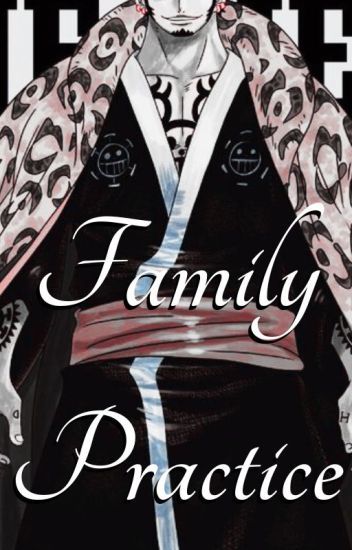
Chapter 1: Linguistically
College life was a change in pace from what you were used to. It was calmer, quieter, far more peaceful, and honestly safer than your usual routine. Well, safer in that you weren’t fighting for money, or parkouring through the back alleys of Grandline City. And those activities were safer than life had been around your biological father.
But that was to be expected. When you were six years old your father – Captain Sakazuki Akainu – shot your mother dead at the Moim. The Moim is conference gathering of the top businesses in the land, almost all of which had underworld connections, and your father had attempted to raid it because of his dedication to the ideal of “Absolute Justice”. Someone had taken your mother hostage and he had handled the issue with cold efficiency.
You survived, thanks to a then teenage Marco and his twin brother Thatch. Thatch had rushed after your father as a distraction and Macro had scooped you up and disappeared into the crowd. After that, their father, Edward Newgate, had taken you in and raised you. You weren’t legally related to him, but he’s kept you sheltered, and protected as you’ve grown into your own.
Edward Newgate, and his dozen or so adopted boys, were at the center of the Newgate Family. A mostly local mafia family in Grandline Metro that had its hands in a dozen or so different things. You didn’t know all the details, but you weren’t completely ignorant of it. You might call him Pops like the boys do, but you’re not legitimately a part of the crew – though you likely could be if you wished it.
Coming to college was part of an agreement with the old man. He wanted you to be able to pursue whatever you were interested in, without worrying about it being a gain or loss for the Family. If you decided to join officially after you graduated, then he wouldn’t argue against it. If you decided to move out on your own, he’d make sure you were on your feet and things would go from there, and that didn’t mean you’d have to cut ties with Pops and the boys.
Family was family, no matter what shape it took. Unless you stepped away intentionally, or did something unforgivable, they’d all have your back, one way or another.
Admittedly, the hardest part of adjusting to college was being on your own so completely. You did things by yourself a lot, even as you were growing up, but you had been backed up by the boys in some way ever since Marco and Thatch had saved you. Sure, you could probably swing the Newgate name around at college, even at one outside Grandline City like this was, and find it offered you some protection. The plan was to try and exist without that, to try and sort out who you were as yourself, not as the tangential only “daughter” of Edward Newgate.
Part of that meant that when you noticed there were a dozen Charlotte children on campus with you, you did your best to ignore them. Since you weren’t ever officially introduced during any of the Newgate parties, none of the kids should recognize you, and you were okay with that. More than okay with it, if you were being honest.
Charlotte Lin-Lin, aka Big Mom, was on par with Pops in terms of power, though she was based in another city. She had 85 kids, and counting as far as you knew, despite her age, and that was impressive since it was 85 more kids than you ever expected to have. Granted, a good chunk of those 85 kids were born six or ten at a time, which was another feat of human creation that you never wanted to experience.
Lin-Lin liked to use her kids to forge marriage ties with friends and rivals alike. Considering the Charlotte Family was just as much an underground organization as an actual blood family, the process of forging bonds with business partners could be deadly. People who turned down invitations and “requests” would often find themselves with little worries in the afterlife.
Aside from the whole being in the afterlife part.
You walk into the library, looking for a quiet corner you can study in when you notice some of the girls from your English class, specifically, Charlotte Nutmeg and her friends. They’re pointing and whispering and giggling about someone sitting off in a study desk by themselves. They don’t look or sound like they’re planning on being mean, but there’s something about the way they’re talking that makes you take note. It’s almost like they’re fishing for Nutmeg’s Mrs. Degree.
(A/N - A “Mrs. Degree” or “Mr. Degree” is someone who goes to college with no intent to get their own degree, but rather to find someone who is going for a lucrative degree and starting a relationship with them.)
Pops made sure you were aware of as many of the mafia families as he could before he sent you off to college on your own. The agreement was to keep your head down, but you were who you were, and if you were going to get into trouble, he wanted you to be aware of how deep it could go. You had no intention of facing anyone from Big Mom’s family head on, but you knew that the kids were often betrothed based on their mother’s whims.
The few that married on their own, only got away with it because they managed to find useful partners that Big Mom would approve of. That process of finding someone on their own, however, couldn’t result in any waves, so the Charlotte kids had a strict code. No messing with someone already taken, and no getting involved in unnecessary drama. If things went sideways and Mama caught wind of things too soon, then it would all be for naught – they’d be betrothed before the next sunrise.
That made helping whatever poor sap they had in their sights relatively easy. So long as you could get him to play along fast enough.
You visibly perked up as you moved toward the young dark-haired man that the girls were giggling over and called out to him. He had a vibe similar to a high school friend of yours named Roronoa Zoro, so you pretended that’s who you were greeting.
“Hey, thanks for waiting,” you said as you approached. You were sitting down across from a very grumpy looking dark-haired young man who had some impressively dark circles under his eyes, and before he could say or do anything you continued a little more quietly. “Play along.”
You gave him your best disarming smile, leaving your books on the seat next to you so there wasn’t an accidental barrier between the two of you. The point was to convince Nutmeg and her gaggle of “profilers” that the two of you knew each other well. His eyes narrowed at you, and then he looked around without moving his head and closed his eyes, a flash of irritation crossing his face that even you barely caught despite sitting in front of him.
“You’re welcome.” He answers you evenly. He’s not speaking too loudly, but he’s at least got the sense to not look overtly irritated. You notice his hands are covered in tattoos, and his books are mostly medical subjects. If it wasn’t for the deep exhaustion sinking into him, you’re pretty sure you wouldn’t have been fast enough to help him before he would’ve just gotten up and walked away.
Lucky for him he’s tired.
You open your phone and type into an empty text message. “I got those tickets, so we should be good to go for this weekend.” You say happily, holding the phone up for him to read it. “I tried to get some good seats; I know how important a good perspective is.” You’re doing your best to look like a long-time comfortable-around-him girlfriend, and not some wacko stranger. Which is a little challenging since you feel a bit like a wacko stranger.
Thanks to Luffy and Ace being friendly with everyone and anyone, you have a decent amount of practice in being comfortable around random people. Luffy never met someone who wasn’t a friend, and Ace tended to buy appetizers and booze for people when he went out. The two had even made a few friends with their fists. You still weren’t sure how broken noses and split lips could lead to being besties with someone, but you’d seen it happen at least three times between the two of them.
Text: Charlotte Nutmeg has you in her sights, and her family is dangerously pushy about marriage. Unless you *want* to be someone’s Mrs. Degree, in which case I can leave and wish you well with your prize.
“Oh, those are good seats, good job.” He replies, and even manages to flash you a smile.
You suppress the urge to snap a picture of him, even though you’re quite sure that smile is rarer than a blue moon. You’re trying to help the guy, not piss him off.
“Aww, it’s always nice to have one’s efforts appreciated.” You beam, giving your own best smile. You catch them leaving out of the corner of your eye and set your books down on the table and let out a breath, sinking into the chair. “Gods, sorry about that. Er, I mean, not sorry for it, but sorry I had to bug you.”
“I appreciate it.” He says flatly. “What did you mean by dangerously pushy?”
“Ah, the Charlotte family is notorious for arranged marriages. Their matriarch is terrifying, and she’s strong-armed a lot of marriages for her own benefit. Some of her kids will set their sights on successful people of their choosing and try to avoid having mommy dearest set them up.” You explain, opting to omit the whole Mafia Family detail, since you have no idea how this guy would react to it. The underworld was extensive, but the number of people who knew about it outside of the marines was small.
“… I’m hardly successful. I’m still in college.”
“Yuh-huh. Wow me some more with your humility there, Pre-Med.” You teased, nodding your chin toward his stack of books. You extend your hand, “(F/N)(L/N), linguistics major, Grandline City, pleasure to make your acquaintance, Pre-Med.”
He accepts your hand and shakes it once. “Trafalgar Law,” he says. “I’m not pre-med, I’m a graduate student. I was just re-reading my old notes.” He said, tilting the book up to show you all the notes and highlights that were in the book despite there being no such supplies around him.
“With that level of dedication, I feel like I should just start calling you Doc now.” You admit with a smile.
“… I’d rather you wait until I earn it,” he answered shortly, irritation finally showing up on his features. “Not that I expect to see you after today.”
“Aw, c’mon, accidental friends are the best.” You say with a smile. “Besides, we can help each other out.”
“Are you being hounded by a Charlotte family son?” He raises an eyebrow, like he already knows the answer.
You snort a laugh. “Maybe if they knew who my dad was, but no. No, I mean I’m majoring in Linguistics and you’re studying your pre-med notes. I can quiz you on terminology. You get some practice, and I get to geek out over root words and if I’m really lucky some syntax.” You lean against the desk and wiggle your eyebrows in a mix of mock, and honest, excitement. “Besides, I bet you could use a everyone-assumes-I’m-the-girlfriend-friend.”
“What makes you say that?” He doesn’t even look at you as he asks, picking up his drink.
You give him a flat look. “The continued humility’s cute, I’ll give you that, but you’re hot.” He chokes on his coffee, just barely managing to keep the sputtering inside the cup. “I imagine you get asked out at least once a week. More than that at the start of a new semester, until word gets around with the new freshmen that you’re just. Not. Interested.” You punctuate the last few words, feigning an expression of appropriate long-suffering.
Law sets his cup down and pinches the bridge of his nose. You can see his ears going pink, but you think better of teasing him for that, you’ll rib this guy into oblivion if you push much more. “That’s quite the accurate assumption.” He admits with a sigh. “Alright, (L/N)-ya, I’ll give you the benefit of the doubt.”
“I think this is the beginning of a beautiful friendship.” You say with a grin.
He grunts, though there’s a sort of positive sound to it, and mutters mostly to himself.
“She goes around saving people random headaches, peers into their pasts, compliments them, and watches really old movies,” Law looks up from his notes. “I’ll give you credit on being multi-faceted, at least.”
“Says the guy who knows it was from a ‘really old movie’. Full disclosure, I don’t actually like that movie, Pops loves that it, and I’ve probably seen it a dozen times against my will.” You admit.
“Pops?”
“Mm, now there’s a story for another time, Dah-erm-Law.” You say with a smile. “A girl needs a slight air of mystery or things are no fun.” You motion for the book he has open. “I was serious earlier, let me quiz you. Oh! Or you could teach it to me, they say a good way to study is to teach the material to someone. Makes it stick.”
“Let’s start with you quizzing me,” he replies, handing over the book.
20 notes
·
View notes
Text
blah blah characterization blah blah
one of the ways i have like, made my peace with the fact that later season prentiss seems off to me (off in ways that aren't merely like, oh the job changed her or whatever, oh the show's tone has kind of shifted and its commitments are more halfhearted and being a senior member of the team means you're written differently, etc.) is the sort of character position trajectory. like, it's really obvious that we work among types: gideon -> rossi; the two jj replacements we get are jordan todd (parallel problem of commitment, foil & mirror for jj) and seaver (obviously a special case, more of a parallel than a replacement, but Blonde. family at issue again); the self-aware but still kind of miserable derek -> luke wonderful hunk of color position. obv these kind of wander between narrative purpose, demographic, and physical resemblance.
this sort of gets nebulous the further we go in the show as we lose and gain characters, but i feel like it's still present. so, like, among all this you have first elle greenaway, who is like... white girl but dark haired, which is, as we all know, the edgy type of girl, and is sort of a counterpoint to jj as a result. emily prentiss picks up and furthers this trope-- she's not quite as harsh as greenaway can be, but the show is also sort of stepping back from that sharp of an edge on a character. prentiss is individualistic and strong-willed like elle, but in a different direction-- her entire narrative is characterized by this overwhelming desire + need to be in the team. it's funny because on most other levels she's a problem for how the team can be conceptualized (here i am shelving moral compass etc. thought process), but a lot of her early characterization is about union with and the unity of the team. i am not making this post much longer.
anyway the fraught position of the Dark Haired White Woman Agent is one which, imo, clearly is always thinking of the next character as a successor or sequel to, or comment on, the previous character-- prentiss's early arc feels a bit like patching up the ramifications of what went down with elle greenaway, alex blake as a professor of linguistics is an obvious callback to prentiss' ostensible function but also strikes me as an attempt to have it both ways, and not present a character who is merely a stopgap. a child is pretty central to her exit, which picks up on the lesser but still evident significance of children for prentiss; and we get this again with callahan, extremely centrally. the point is that like, by the time we get to prentiss returning she's replacing both hotch and callahan, and is stepping into a position which has become more overtly parental, and more specifically maternal, while also being sort of stripped of its early difficulties-- one of the reasons, it feels like, that greenaway and prentiss could be so troublesome for the team was that they were more junior agents, who were clearly treated as still being shaped. so at the return i don't really recognize prentiss, in part because there is a lot of generality to the writing in cm outside of the current Thing about the character, and in part because what's changed about her is her narrative function and purpose, which means that a lot of the character traits that i am most drawn to about her are absent, forgotten, or severely backgrounded. i don't know how much this registers or matters, because i'm sure Moral Status and Narrative Function aren't quite as big in other people's character evaluation, but i do firmly believe that it is a huge and troublesome character shift for her, like properly a point of fracture. if you're reading this like shut the fuck up this is dumb and minor, yea sure whatever. of course it is. but the thing is that prentiss + elle were notably morally askew from the team, which allowed for things like elle's whole exit arc and the s2 finale / s3 prentiss arc, as well as the entire doyle arc. like no one else on the team would have faced doyle the way prentiss did, and certainly not without a more clear articulation present. flash forward to reid in prison arc where prentiss is, repeatedly, there to assure him of and affirm his moral goodness, and bring the law in line with that. there's the obvious protective / parental element to that, right, which is what has been added by the late season characterization, but there's also the fact that, like, this sort of moral surety has everything to do with that narrative function, and very little to do with any meaningful understanding of how she thinks about goodness or morality. if i wanted to actually be clear at this point i'd be writing like 5 more paragraphs so i'm just sticking this under a readmore and peacing out. my biggest gripe is that she's the wrong kind of afraid / wrong kind of cowardly in wheels up and probably if you don't vibe with that take then we just do have different takes on how she works as a character. i've written probably a lot about prentiss having a lot to do with the structure of romance and the trajectory of the romance hero and i just always feel very correct in doing so. etc. peace!
#sorry in the process of this i decided emily prentiss is exactly like childe roland to the dark tower came and i'm tired of myself now#mediaposting
5 notes
·
View notes
Text
Portrait of a Dangerous Man🎨3
Warnings: (series) non-consent sex and rape; slow creep; cucking; (this chapter) sleep paralysis, stress.
This is dark!mob!Clark Kent x reader and explicit. 18+ only. Your media consumption is your own responsibility. Warnings have been given. DO NOT PROCEED if these matters upset you.
Synopsis: Your dream of having your work hung in an art show comes true but your first buyer is not all he seems to be.
Note: I’m so happy people are liking this story. Thanks so much to everyone reading and sorry if I’m a bit inactive lately, I’ve been exhausted and yesterday didn’t end, I swear.
Thanks to everyone for reading and thanks in advance for all your feedback. :)
I really hope you enjoy. 💋
<3 As usual, I’d appreciate if you let me know what you think with a like or reblog or reply or an ask! Love ya!
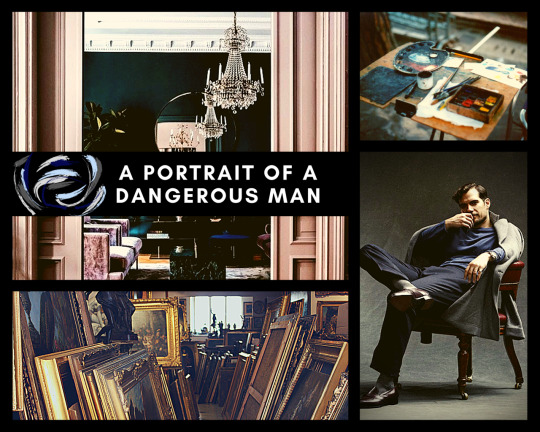
On Monday, you yawned over your keyboard as your fingers moved on instinct alone. Your eyes ran along the text but the words were just letters to you. You had a lot to think about, a lot to do.
You decided you would skip lunch and get through your work day an hour early so you could head to Clark’s right away. He was hard to deny when he asked if you could make it back so soon. You told him you worked everyday from home and you had hours beside that at the gallery three times a week at least. He accepted it with a nod but his silence was telling so you caved and said you could make it but not until the evening.
You texted Marcus as you waited for your Uber. He had a few hours to go still and you left him everything he needed to make supper with instructions; the veggies were cut, the meat thawed, and the pans already arranged on the stove. You had faith he could manage on his own.
The mansion was just as intimidating as the first time you visited. You walked up the drive and to the front steps. It was human nature to be envious of the sprawling yards and lavish estate and yet, it didn’t feel as if someone could truly live here. It would be like staying in a hotel as you were always overly aware of your every move, afraid to break something or make a mess.
You hammered the large knocker when your soft tapping brought no answer. You heard someone on the other side and wiggled your foot nervously. The door opened and square-faced woman greeted you in another language. You couldn’t tell if it was Swedish, German, or some other dialect. You were never a skilled linguist.
“Um, hi, I’m…”
“Ah, you are the lady painter,” she said, “I remember. I am Nina, Mr. Kent’s housekeeper.”
She turned and beckoned you to follow her. You closed the tall door and trailed her across the spacious foyer and behind the stairs into the kitchen. She turned through another room and led you out through the glass doors that opened onto the pool.
“Miss, would you like a drink? Tea? Coffee?” she asked.
“No, thank you,” you said as the water moved and your eyes were drawn to the figure moving beneath the surface.
“Miss,” Nina nodded and left you.
You stood, awkward and listless, and glanced around at the loungers and the umbrella over the round table. You weren’t entirely sure what to do. Had he forgotten about you?
“Hey,” your gaze was drawn back to the pool. Clark waded to the edge, his broad shoulders and chiseled chest visible as he made his way to the shallow end, “sorry. Lost track of time.”
He grabbed the metal railing and climbed up the stairs. The water slaked off his tight trunks and down his thick thighs. He appeared even larger with less clothes. You looked away before your thoughts lingered too long.
“It’s fine, I should have texted I was on my way,” you said, “I can go wait for you--”
“No worries,” he took his towel and rubbed dry his dark hair. The scruff along his chin was thicker than before, almost a full blown beard, “you’re not in a hurry, are you?”
“No, not really, can’t really rush… painting,” you shrugged, “I just… I didn’t mean to catch you off-guard.”
“Pfft, I’m ready for anything,” he grinned, “but I should also listen to the artist. I’ll go get changed and you can get settled in the studio.” He directed you ahead of him as he approached the sliding doors, “you just finished work? You should take a few minutes to unwind.”
“Uh, yeah, but it’s just, um, typing, not exactly hard labour,” you said as he followed you inside.
“Work is work,” he said, “I will never fault anyone who works hard, regardless of what they do.”
“Yeah, I suppose,” you stifled a yawn behind your hand.
He let out a breath as you came out into the foyer, “I’m sorry, you could’ve… you’re tired. We could have rescheduled. I’m sorry if I came across… pushy yesterday. I don’t mean to take advantage of you.”
“No, no, it’s fine,” you assured him, “I’m fine.”
“Alright,” he said doubtfully, “but you let me know if you need a break.”
“Will do,” you murmured as you neared the stairs.
🎨
You weren’t even close to done just the background of the portrait. Clark really didn’t even need to be there as you shadowed the folds of the curtains around his figure and the marble bust. Your arm hurt from reaching across and up the gigantic canvas and your eyes burned from squinting at your work.
You backed off the ladder carefully with your paintbrush and palette balanced in one hand. The paint was drying and you needed to mix more. You set down your armful and wiped your hands on the rag. He was watching you, he was always watching you. Well, no, he was just looking in your direction; it was all for the portrait.
You hit the button on the side of your phone and gasped. It was midnight. You had several messages from Marcus and you blanched as you unlocked the cell and quickly texted back. You rubbed your eye as you hit send and turned to Clark.
“I didn’t realise it was so late,” you said, “I gotta go.”
“What time is it?” he asked and looked at his watch, “oh.”
He pushed himself to his feet with a grunt and stretched out his arms as he neared. You took your brush and rinsed it in the tinted water in the jar.
“I’ll just clean up as I wait for an Uber,” you said as you let the brush rest in the jar and lifted your phone again.
“I’ll drive you,” he said as he grabbed a rag, “it’s a long way. I’ll hire a driver for you from here on out. It’ll be easier and cheaper.”
“You don’t have to--”
You flinched as he wiped your cheek with the rag. He smiled and showed you the paint on the white cloth.
“I wouldn’t offer it if it was too much trouble,” he tossed the rag down, “and I did have something to talk to you about. The drive will be more than enough to get it sorted.”
“Oh, okay,” you eked nervously. Had you done something wrong? Were you not painting fast enough?
“I’ll meet you downstairs,” he touched your arm gently.
He left you and you finished scraping off the palette and cleaning your brushes. You dumped the jar in the sink just inside the nearest bathroom and rinsed the porcelain back to white. You left everything arranged neatly on the table and descended to the first floor.
Clark stood by the door in a different jacket, his tie gone and the top button undone. He held the door for you and showed you to the garage. There were at least a half-dozen cars inside and he took you to the same silver one he drove the night of the show. You settled in and groaned as the tension left your shoulders.
He started the car as the doors rose behind him and he backed out smoothly. He turned down the long drive and onto the desolate roads of the wealthy countryside. He kept one hand on the wheel and dropped his other to his thigh casually.
“So, your job, you like it?”
“It’s work,” you said, “I get paid to sit at home and type. Half the time, I’m just waiting for an assignment.”
“I asked if you liked it,” he said more pointedly.
“Oh, well, not… really?” you answered, unsure.
He could be so pleasant and then so blunt. He made you nervous and the more you thought of it, the more you realised you knew almost nothing about this man besides his name. You didn’t know how he made his money or what exactly he did outside of his extravagant mansion.
“If I doubled your fee, would you quit?” he asked without hesitation.
“Quit? This… the painting won’t take forever,” you said, “I can’t really just drop everything--”
“This is an opportunity,” he said, “you could spend your days doing what you love. And who’s to say it’s just one painting? I already have something in mind for the dining room and I have friends asking about you.”
“Friends? Who--”
“One thing at a time,” he said curtly, “I’ll introduce you to them in time. Is it a deal?”
“I… it’s all very sudden, can I think about it?”
He looked at you in the rearview and you caught his eye. For a moment, you were afraid. There was something in his expression that left you breathless. He lifted his hand and stretched his arm between the seats, his fingers gripped the leather just above your shoulder.
“Sure, I’ll give you a couple days,” he said at last.
“I--I’m sorry…” you didn’t know why you were apologizing but it felt appropriate, “I just, I’m tired.”
“It’s fine, sweetheart,” he assured and the epithet hung in the air.
“I have to go to the gallery tomorrow, I’ll get back to you on Wednesday,” you said as you rubbed your chin nervously. Your lips was quivering. He was smiling but you felt his impatience in the small space of the car, “if I… if I say yes, I have to talk to my boss and that might get messy.”
“No problem,” his voice softened, “you take some time and figure it out.” His thumb rubbed the leather seat and he pulled his arm away to grasp the steering wheel, “why don’t you close your eyes. We got some time left.”
You peeked over at him and nodded.
“Okay,” you murmured and hugged your bag against you as you tried to relax against the leather. You turned your head and looked out the window up at the starry sky. You closed your eyes as the fatigue settled over you but you could only fake dozing as your nerves stormed inside of you.
He was right, it was a great opportunity, but you just couldn’t believe it would last. Was it your own doubt getting to you? Or should you be weary of this fairytale buyer? It was late and you couldn’t think. All those worries could wait until tomorrow.
🎨
You crept into the dark apartment. It was after one and you foresaw a long day ahead of you. You’d get maybe four hours in before it all started again. You put your purse down and went into the bedroom, undressing in the shadows and crawling into bed next to Marcus as the colours of the tv moved around him. The playlist he was casting kept on even as he slept.
He grunted as you laid on your back and he turned to graze your arm with his fingertips.
“You’re home,” he grumbled and kissed your cheek, “I was worried.”
“I’m sorry,” you whispered, “I… it’s so far out there and it’s a lot of work. The canvas is like nine feet-- I’m sorry, I’ll let you sleep.”
“No, no, it’s okay,” his voice was gristly as he propped himself up on his elbow, “you’re gonna finish the job right?”
“I don’t know,” you said, “I don’t know if I can.”
“Of course you can,” Marcus insisted, “I mean, at that price, you can do anything.”
“It’s not about the money, Marcus,” you huffed, “I don’t know if it’s worth all this. Going back and forth…” you ran your hands over your face, “he wants me to quit my job and just paint for him.”
“You should,” Marcus said blithely, “why not? He’s paying you well enough.”
“And what about when I’m done,” you whined.
“You’ll find more work. Vanessa even offered to take on more of your work in her shows, so what’s the problem? Isn’t this what you want?”
“Y-yeah, it is but… I don’t know, it just seems too good to be true.”
“You do this and we might even have enough for a down payment,” he said, “something had to give after all these years. Why can’t it be this?”
You looked at him and tried to smile, “you’re only saying that because he has a pool.”
“Maybe,” he kidded, “but I also want it for you. You spend all your free time painting anyhow so why not get paid for it?”
“Mhmm,” you mumbled, “yeah, I just don’t know why I feel so… I don’t know. It just all seems off.”
“Sleep on it, you’ll feel better,” he leaned over and kissed your lips that time, “love you.”
“Love you,” you echoed as he grabbed the remote and shut off the tv.
You closed your eyes as the darkness shrouded you and despite your anxiety, you fell into a deep sleep. You didn’t even roll onto your side before you sank into your REM but found yourself caught in limbo. The abstract and intense sensation of paralysis overtook your body and your eyelids flicked open.
It was an awful feeling you knew too well. You knew you were dreaming, you knew it was all in your mind, but your body was filled with sand and your subconscious conjured visions of doom. The tall man stood by the door as he always did and just stared. He got closer, just a little at a time, and you fought to move just a finger and free yourself from the trance.
You felt like you were drowning as your body remained heavy and unmoving. He was getting closer and closer. As he did, his figure changed and his shoulders got wider as his features came clear in the slat of the streetlight that leaked between the curtains. It was Clark staring down at you, his blue eyes sinister and sparkling.
He reached for you and you woke with a start as your name rose from his lips. You inhaled sharply and looked over at Marcus as he snored. It was only the two of you. You reached for your phone, it was just after three. You turned onto your side but your heart still raced. It always happened when you were stressed, the dreams felt so real that you never really came back down after.
You stared at the wall and curled up under the blanket. You didn’t expect to get much sleep anyway, not with the question on your mind. Should you quit and live your dream or should you kill all hope before life did it for you?
#clark kent#dark clark kent#dark!clark kent#clark kent x reader#superman#series#portrait of a dangerous man#fic#dark fic#dark!fic#au#mob au#mob!au#dc#dcu
562 notes
·
View notes
Text
a few notes on translation
hey everyone, in light of some of my recent posts (here and here) making the rounds, I’d like to say a few things.
first, I want to say that I am not interested in trying to find a satisfactory english translation of zewu-jun at this time. I know everyone means well and is sharing different ideas out of excitement. that’s great!! I’m very glad I could get you all to consider the complexity of the title and all the pitfalls that come with trying to translate it! however, I do not wish to receive any more suggestions on how to translate zewu-jun. as I said, forcing one language into the shape of another is never going to work perfectly. that’s the nature of the thing.
I understand the impulse and temptation to try to find words in your own language to describe something that you care about, of course I do. but sometimes, you won’t be able to find those words--perhaps they elude you, or perhaps they don’t exist at all. there’s a discomfort in that, I know, but I hope everyone reading this can forgive me for saying that I want you all to live in that discomfort. after all, I have lived here my whole life. when I speak to my family, I do so knowing that I am constantly interacting with them through translation. that no matter how good my english is, it will fail me when it comes time to transmute my thoughts into chinese words.
not gonna lie, it sucks.
It occurred to me sometime in college, I think, that many people don’t experience this: the inherent alienation of not sharing a native language or culture with your parents. I was fiercely jealous, suddenly. I think about all the times my mother and I failed to communicate because of this barrier. I think about all the times that failure hurt. it all felt very unfair.
in a sort of roundabout way, I suppose my current refusal to provide, or even search for, a simple translation of zewu-jun is my attempt to force some of you to experience this, just a little. the feeling of not being able to capture your thoughts in words. the feeling of not being able to communicate. maybe that’s unkind of me, I don’t know.
every time I translate seriously, I think about how lawrence venuti described the violence of translation:
My use of the word “violence” here has been questioned by a professional translator ... Yet if by this term we mean “damage” or “abuse”, then my use of it is neither exaggerated nor metaphoric, but precisely descriptive: a translator is forced not only to eliminate aspects of the signifying chain that constitutes the foreign text, starting with its graphematic and acoustic features, but also to dismantle and disarrange that chain in accordance with the structural differences between languages, so that both the foreign text and its relations to other texts in the foreign culture never remain intact after the translation process.
Translation is the forcible replacement of the linguistic and cultural differences of the foreign text with a text that is intelligible to the translating-language reader. These differences can never be entirely removed, but they necessarily undergo a reduction and exclusion of possibilities - and an exorbitant gain of other possibilities specific to the translating language. ...
The aim of translation is to bring back a cultural other as the recognizable, the familiar, even the same; and this aim always risks a wholesale domestication of the foreign text, [oftentimes serving] as an appropriation of foreign cultures for agendas in the receiving situation, cultural, economic, political. Translation is not an untroubled communication of a foreign text, but an interpretation that is always limited by its address to specific audiences and by the cultural or institutional situations where the translated text is intended to circulate and function. [emphasis mine]
-- Lawrence Venuti, The Translator’s Invisibility, 2nd edition p.14 [line breaks added for readability]
it’s wordy, I know, but I think very important in a time when english is becoming/has become the world’s lingua franca, and brings with it its history of imperialism and colonialism. we have to acknowledge that the act of translation comes with violence, sometimes intentional, sometimes not. i don’t agree with venuti entirely--I think translation always damages, but does not always abuse. regardless, i have a very hard time taking this lightly, which is why I don’t do this for a job lol can you imagine.
i bring this up because it’s something that I want people to consider: that the very act of translation is violent. that the fact that we can experience this story at all is violent. that the constant search and demand for the “right” translation is, indeed, violent. that’s okay. it comes with the territory. i’m here too, and I’m glad to have met you. 💛 but I want us all to be able to acknowledge the fact that every time we talk about the source text in a different language, we are holding knives.
i obviously do not think that translation is bad, far from it. i think it’s wonderful and wondrous to be able to communicate across cultures and across time. i read mdzs in translation first, after all. I had to, much like most of you. without it, I would never have been able to experience this story that has become so important to me! translation, for all that it damages, also creates. it makes beautiful things. it is necessary. I love doing it, I love trying to find the right balance so that someone else can also fall in love with this thing I love.
whether or not you agree that translation is inherently violent is ultimately up to you: this is a philosophy, not a truth. I am not particularly well-versed in the discourse of translation. it’s possible that this is considered a truth in translation circles. as of writing this, I wouldn’t know. however, it is a philosophy that I subscribe to--it ensures that I keep my ego in check and reminds me that, like pretty much everything, translation is inevitably political and that it can have significant ramifications.
i want to end this by cycling back to the beginning of this post. all of the suggestions I’ve received are innocuous and well-meaning. I don’t want anyone to feel bad about sending them. i hope you don’t by the end of this post! like I said, I appreciate that they’re all coming from a place of enthusiasm and love. i promise you, I get it. but I won’t be responding to any others.
if you’ve gotten to this point, i urge you all to read @hunxi-guilai‘s notes on her translation process here. she and I have very similar approaches and concerns when we try our hand at mdzs/cql translations, even if we don’t come from or end up at the same place. Though we have a similar cultural background, we have very different wells of knowledge. she does things I can’t, and I do things she can’t. we prioritize differently. but in that post, you can see a practical application of what I’m trying to say here.
and finally, remember, like hunxi said in her disclaimer: we are human, subjective, and fallible. and, in this case, we are both american. do not take our word as law, do not assume that our heritage makes us experts, or gives us a pass. it’s vital to apply your own reasoning to our posts, including this one.
in summary, here is what I want to say: 1) translations will always fail, 2) translations are always violent, 3) the way many people in EN fandom continue to try and find “the perfect translation” for terms and names is part of that violence, 4) if you like the things I post and talk about, then I hope you’ll think about this too
thanks, everyone 💛
#translation#translation theory#mdzs#the untamed#mine#mymeta#cyan gets too deep in the weeds#long post#rip to me i guess#is this even coherent? idk#is there a thesis in this? kinda maybe#look i just think about translation a whole lot#and what translation can do#and the myriad of ways it can be used as a weapon#or a tool#mdzs meta#racism#fandom#cyan vs heritage
472 notes
·
View notes
Note
Consider this ask a general prompt for any nerding you would like to do for us re: linguistic thoughts about various Cullens. Also: any particular headcanons of how they've influenced each other's speech in general? (I was going to say re: Edward emulating Carlisle but that might not be the most interesting example)
Okay commence much belated nerding out. Relevant post.
Under a cut because sorry, I went to town here. tl;dr--the Cullens sound different to each other, and their backgrounds and relationships have affected the way they sound over time. But they all can sound exactly how they need to any time they need to.
Here are two useful things we know about why people do or do not change the way they talk.
Communities of practice: this is a concept which comes from education but which has gotten adopted in several adjacent fields, including sociology and linguistics. Basically, the idea is, the way you talk will reflect the kinds of relationships you want to have with people around you, and how you want to draw lines separating your group from other groups. My easiest-to-understand example of this is that my friends from college athletic bands had some terms and inside practices which arose because of our shared experience of playing in those bands. We were in band twenty years ago, but if you're having drinks with a few other bandos and leave the bar, someone will go "ohhhhh see ya!" like the cheer we yell when someone gets put in the penalty box at a hockey game.
Convergence and accommodation: Speakers often try to sound like people they want to connect with in more than just practices and inside jokes. The more you want to connect with someone (combined with your personality), the more likely you are to adopt their style of speaking. This is in the short term, which is accommodation (you start to speak more slowly because the person you're speaking with speaks more slowly) or dialect convergence (over time your whole way of sounding starts to shift toward other people's.) Some evidence that extroverts do this faster, but it also depends on how desirable the connection is.
Convergence is probably more influential for the Cullens than CoP, although I imagine there are some CoP kinds of things that happen to vampires more broadly and the Cullens specifically. In particular, I suspect (and write) that the Cullens have lots of euphemisms for things: they talk about "mistakes" to avoid talking about murder, about "Royce" and "Charles" to avoid uttering the word rape, Edward's rebellion is called The Time or Edward's Sojourn (that's Carlisle).
The bigger question is, how would they sound and how would they naturally converge (or not!) based on their personalities and relationship.
So. You have the Cullens. Kind of a rough-and-tumble rundown of their varieties:
Carlisle: I headcanon Boston Brahmin . In the 1700s, the London accent was /r/-full, so Carlisle would've arrived to the US sounding more like a current-day American speaker than we associate now with British English (received pronunciation usually being the exported one). He would've hobknobbed with the educated elite on the eastern seaboard and picked up what they sounded like at the time. He loves being American--this is where he found his purpose and his family. So shifting toward that accent makes sense for him.
Esme: Lower middle class US midlands. The central Ohio accent is often perceived to be extremely neutral. It's not--there are some truly funky features--but people think it is, so there's not much reason to move away from it. She might have tried her hand at a transatlantic accent, but she slides back into her middle Ohioan often, because it's easy and it's not usually considered "bad" anywhere. She makes fun of the way Carlisle says rather. He teases her about how bag and egg are the same sound for her.
Edward: Northern Cities Shifted Chicago. If you've ever heard a Chicagoan pronounce the word Chicago, well, there you go. I realize this probably fucks with the gentle, sexy attempt-at-American accent delivered by Robert Pattinson. Edward was born too late to have transatlantic imposed on him, and so his accent was probably left to be.
Rosalie: Another reason they hate each other--they sound alike. Rosalie is on the other side of the Great Lakes, was born not that much later, and Rochester is another major source of Northern Cities Shift. So she and Edward sound...pretty much the same. They're both upper middle class/upper class and are picking up the prestige version of the NCVS.
Emmett: Appalachian. Pretty much enough said. The post I linked at the outset lays out a few things from Appalachian speech.
Jasper: East Texan. Texas is not general southern--there are a handful of features which make it notably different than say, Louisiana.
Alice: Upper class Mississippian. Now, this is somewhat indistinguishable to a northern American or non-American ear--maaaaybe you notice sort of "high class southern" but it's subtle. She's got a bunch of features of southern English, though, but the more prestigious versions of them. Not quite To Kill a Mockingbird--that's Alabama-- but that's not a bad place to start to hear it.
So that's where they're starting. Where do they end up?
Carlisle: sticks with Brahmin. The moment he arrived in the US means a lot to him, and so he defaults back to that first major change, when he adopted an American identity.
Edward: Probably goes without saying, but he sounds exactly like Carlisle. He shifted his default as soon as he was able, and his intense adoration of Carlisle means he converged on Carlisle's variety. He also picks up Carlisle's idiolect--particular phrases and verbal tics--again, because he wants to be like Carlisle in any way he can. "Oh my God will you quit; you're not Carlisle" is a phrase that gets uttered in annoyance often.
Esme: Keeps her central Ohio accent. She loves Carlisle more than anything, but there's nothing particularly stigmatized about her variety. So she keeps it. She's happy to be her own person.
Rosalie: Does not wish to be a part of this family and regrets her change. She certainly does not converge toward Carlisle's style, but the pressure of sounding anything like Edward, even if his dialect has shifted, is also grating. She brings her NCVS a little more toward Esme's Ohio variety over time.
Emmett: This man killed a bear* with his bare hands in the Smoky Mountains. He's real proud of being a mountain man and he sounds like one. He also has a healthy disdain for the upper-crustness of Carlisle and Rosalie and Edward and is determined to bring them back down to earth. Over time the most obvious parts of his dialect do fade--he doesn't use "a huntin'" very often, for instance. But he can shift into full on Appalachian on a dime and often does. It's fun for him.
Jasper: Stays East Texas. He's very proud of his cowboy identity, and is the least connected to the Cullen family as a community of practice. He can sound like whatever his paperwork says he does, but in default, he's still got the same Houston variety he's had for two centuries. I don't love darlin' darlin' Jasper in fic but I chalk that more up to writers learning how to have a light hand with dialect rather than it being something he fundamentally wouldn't say--he absolutely does say it. Also says bless your heart.
Alice: Biloxi is not that far from Houston, and she and Jasper, who are wound around each other, pick up each other's verbal mannerisms and reinforce subtle aspects of each other's gulf of Mexico accents. She both mellows Jasper's Texas English while also moving her own English toward his.
So in "default" mode, the Cullens sound a little different to each other. But there's no way a Twipire would somehow be unable to move perfectly and seamlessly between multiple English accents as they needed to. There's no reason to think that any of them showed up at Forks High School sounding like anything but exactly what their paperwork said their dialectal background ought to be.
*by the way this would've been a black bear, not a grizzly. I'm sure he loves grizzlies, but he wasn't fighting a grizzly in the Smokies. He probably got tangled up with a really mad mama bear. This is a pet peeve of mine, I admit.
#linguistics#twilight#accents#cullen family#carlisle cullen#esme cullen#edward cullen#rosalie hale#alice cullen#jasper hale#long post#giselle gets too srs bsns#tw: rape mention
89 notes
·
View notes
Text
scene four: tongues
one time someone asked me to say sorry.
'huh?' the asparagus clamped between my chopsticks began to slide towards the bottom of my lunch box, forgotten. i frowned. 'did i do something wrong?'
'no,' he said, laughing. 'i just want to hear how you pronounce it.'
'so i'm saying it wrong.'
'that's not what i mean.'
'then what do you mean?'
'i mean i'm curious.'
i stared at him. 'no.' i picked up my asparagus. he poked at his biscuits with his fork. time passed, birds sang overhead, snow fell outside the window.
'you know-' he started.
the asparagus on sundays sucks. on weekdays they roast it but on sundays they boil it in a huge pot of water in that grim, white-tiled kitchen that i've only gotten a few glimpses of and then it's a straight path to the metal pans that appear behind the glass when you step into the dining hall, hoping someone will betray your well-set expectations and for once, the 'fish' will be 'salted'. i didn't know why i'd asked for it to begin with. last week i hadn't. this week i had brought what i hoped would become a friend with me, though he was, by all accounts, still a stranger.
'what.'
'the way you say sorry feels kinda canadian to me,' he said thoughtfully. 'not justin bieber-canadian, but, like, old-fashioned canadian. see? like this.' he puckered his lips. 'sooh-ree.' he nodded to himself like he'd just accomplished an incredibly impressive feat. 'the way you emphasize the 'oooh' sound. no one says it like that here.'
when i was ten i had a weird phineas and ferb phase. we didn't have cable tv so i'd look up the episodes on youtube in splintered halves and thirds, watch whatever i could find in 240p and look up the plot synopsis for the bits i couldn't. perry the platypus was my favorite character at first, because he was turquoise (turquoise was my favorite color when i was ten) and he had a cool hat and he had a knack for appearing in places that one typically didn't expect a platypus to appear in, which both resonated with and annoyed me, but eventually i lost interest because perry the platypus didn't have a voice. he was a platypus, after all.
'huh.' there were still two spears of asparagus left in my box but i didn't feel like eating them anymore.
he leaned over the table, his eyes bright and searching, like a child's.
'am i right?'
when i was ten i sounded sort-of-american for a few months. i remember even my mom picked up on it after a while, commenting mildly over dinner that i was speaking differently wasn't i, i almost sounded like i did when i went to the international school, and i remember flushing with pride, choking on my rice, having to excuse myself to the bathroom immediately afterwards to hack it all up in the sink. after all, i'd been practising. if perry the platypus had had a voice, i would've practised his lines too. but he didn't. so i practised with the others. i hit pause and play and pause and play, repeating things out loud, sounding out the vowels, trying to nail each word to the wall on the other side of my room like i was holding a pistol in a gunfight, not my heart.
the first time i went outside in america we were in washington dc and my friend took me to target. it took everything in me to say thank you to the lady behind the counter. i don't know if she heard me.
am i right?
i shrugged. 'i dunno.'
'admit it,' he said smugly, which i thought was quite bold of him seeing how all i really wanted to do right then was punch a hole through the wooden floorboards and drop into the freezer section of the cafe below like a cannonball, killing myself and everyone in a fifteen-mile radius around me instantly. 'i got it right.'
there were a lot of things i could've said to him in that moment. i could've said i was born in texas nineteen years ago to parents from fifteen other parts of the world, or i could've told him about the dream i'd had last night where i was stuck in a supermarket and someone had ripped my vocal chords out but left every other part of me intact, or i could've told him about how there are between nine and ten thousand species of birds on earth and all of them are pretty cool, what do you think of birds, dude, what do you think of this country? did you know? most americans don't think they speak with an accent. to them the american accent is the default, is the way english should be spoken, is the thing they'll stick in the dictionary that the martians will discover thousands of years from now when humanity finally wipes itself out and the trees are left to retrieve their hands from their coffins. when you're american you're always right. the rest of us are deviations from the norm. aberrations. mistakes.
the first time i saw asparagus in america i was getting dinner in the dining hall and it was monday, so the asparagus was roasted, not boiled. 'can i get the asparagus?' i asked. the lady behind the counter looked at me for a moment, expressionless, then pointed at the stalks of green vegetables in the metal tray to her right. 'you mean the asparagus?' i nodded.
in the spring i took a class called intro to linguistics, taught by a kind, square-shaped man with round glasses and minecraft stans for kids who told us on the first day of class, his green beatles background flickering awkwardly behind him, that there is no such thing as bad english. i didn't believe him at first the way i am inclined not to believe anything i'm told without being slapped in the face with it a few times in times of dire need, but eventually i came around. 'i feel like every time i open my mouth i am standing on a big empty stage with a microphone in one hand and everyone is waiting for me to speak,' i wrote in my first assignment for that class. what i meant was: i am scared to death of being heard. what i meant was: i do not feel like a person here.
did you know? as far as we're aware, humans are the only species on this planet that uses words. we built this damn thing out of sawdust and sadness, pouring centuries of sound and sight and sensation into a system that's so fucked up, your only options are either to be born in it or to force your way in with a chainsaw. every day some guy in the youtube comments section of your favorite video, you know the vine where the kid smiles into the camera like she's just shaken hands with god and then points at the field of ducks behind her and goes, 'look at all those chickens!', every day some guy goes to that exact video and replies to some stranger's comment to let them know it's 'you're' not 'your'. every day someone derails a discussion about bitcoin on reddit with a well-placed apostrophe. every day someone laughs at a friend and says they sound a little old-fashioned, a little canadian, none of the kids say it like that anymore, you know? it's weird. you're weird.
so be weird. be a public riot. be that one guy who goes into the dining hall every day and mispronounces half the words on the board, because who the fuck learns how to pronounce asparagus in history class? english literature? i don't even LIKE asparagus. i'm just trying to eat my fucking vegetables, for fuck's sake. i'm just trying to make sure that every once in a while when i open my mouth and something climbs out, someone else catches it. like maybe one day it'll be something beautiful. like maybe one day it'll be a star.
and if you're ever trying to eat your fucking vegetables and someone tells you you're speaking funny, breathing funny, shaking your left leg under the table funny, and if ever you find yourself far from home and struggling to make the words look less like monsters and more like symbols for sadness and someone laughs at that, someone thinks your pain is amusing, then you know what? eat them too. and don't you even think of saying sorry.
::
in the remastered version of this scene he asks me am i right and i say no, you're a dick, and then i leave.
05.24.21
34 notes
·
View notes
Text
Kobayashi’s Maid Dragon S2 Episode 10 Notes

I’m extremely not an expert in birds, but I tried to look these up to see if they were a species native to New York (since they’re similar to the sparrows we usually see around Kobayashi’s place). Apparently there are few similar-looking species in New York? My totally uninformed guess is that they may be house sparrows.
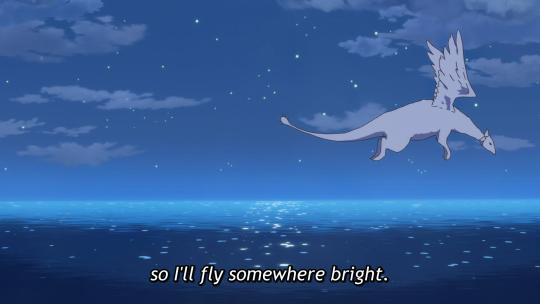
The sun sets in Japan relatively early (probably around 6:30pm when this episode takes place), which would make it entirely plausible that if she just flew east (with a slight northward angle) she’d find herself over New York in the early morning while most of the rest of the country is still dark.
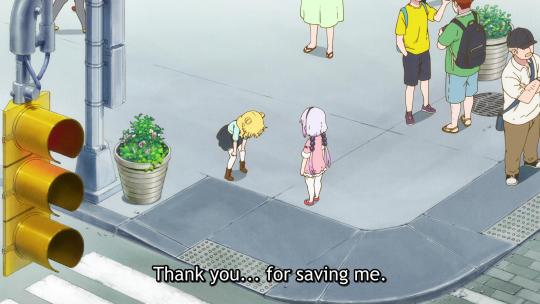
These bumpy grey pads at the pedestrian part of the intersection here are known as (among other things) tactile paving; they’re to assist people who can’t fully rely on eyesight to get around.
Interestingly (imo), they were actually invented in Japan in the 60s (by a Miyake Seiichi), where today they’re extremely ubiquitous. They even show up later this episode!
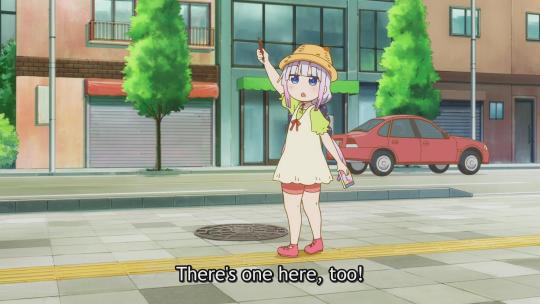
They’re often referred to in Japan as 点字ブロック, tenji (Braille) blocks, and they tend to come in two types: the “dot” design, which indicates a place to stop (or an angle change, or more generally “caution”), and the “line” design which indicates you can safely keep going. They’re generally colored yellow in Japan, ideally making them stand out more to help people with impaired vision find them, and are mandated by law in most places public transport can be found (among others).



Not really a translation note, but “deer cola” felt especially funny in the context of all the horse medicine stuff.
I guess “[animal] [drink]” is a common branding device in-universe, given the crab beer Kobayashi’s always drinking.
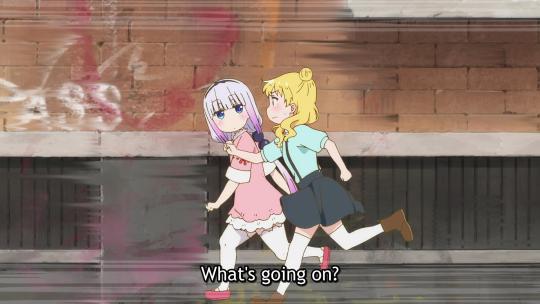
Also not really a translation note, but the difference between how “hard” Kanna and Chloe are running to be at the same speed was a nice animation touch.
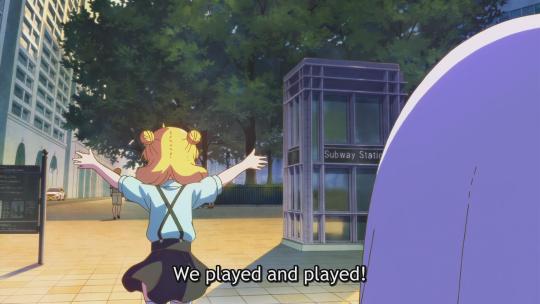
遊んだ遊んだ! asonda asonda!
One feature of the Japanese language is a very heavy use of repetition. This includes “reduplication,” a linguistic term for creating words by repeating a root (e.g. a “boo-boo” in English or the dara-dara example below in Japanese), but also just like… saying the same word multiple times, as Chloe does here.
Typically this is done for emphasis or to help increase clarity: if you’ve worked in a Japanese office, you’ve likely heard someone in a phone conversation say desu desu in response to someone asking for confirmation.
This acceptance of repetition sort of extends beyond the obvious uses like this as well: for example, personal pronouns are much less common; instead (if the subject isn’t dropped) you’ll often just use the person’s name again. You’ll notice similar trends with other types of words as well.
Not to mention the ubiquity of things like otsukare.
This often ends up being a challenge for translators, because reusing words in English (when it’s not for an obvious reason) tends to stick out rather unflatteringly, even if they aren’t that close together.
(Like when I overuse “hence” in these notes.)
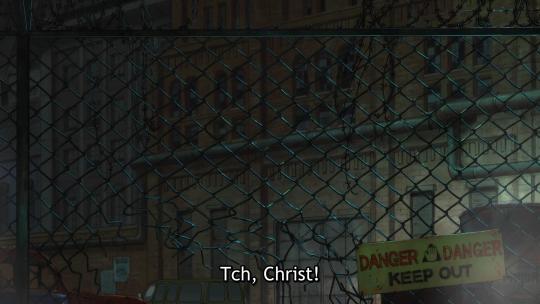
This “Christ” in the Japanese was “ったく” (short for 全く mattaku, but just used as a semi-generic exclamation). I mostly bring this up because it’s a good example of a word that doesn’t work out of its cultural context; e.g. it wouldn’t make any sense for a fantasy character to say “Christ,” but since this is an American speaker it works just fine (and helps distinguish that fact, even).
I think I’ve mentioned this before, but English uses a lot of “explicit reference” words like this, that can break immersion if put in the mouths of characters who wouldn’t have exposure to said reference—which can be annoyingly limiting when trying to write dialogue sometimes.

As a bit of a culture shock for a lot of Americans I’ve met, most Japanese homes tend to have wall mounted air conditioning units, like this one, that are only for heating/cooling the one room they’re in. (Many also have a “Dry” setting that makes them act kind of like a dehumidifier as well.) It’s common to not have them in every room, like bedrooms, however.
This is in contrast to the central air conditioning system used by a majority of homes in the US (though type/use of AC in the US varies a lot by region; less common in the north for example)—and places like the UK where apparently residential AC units of any kind are quite rare.
You may have noticed that the doors between rooms always seem closed in Kobayashi’s apartment. That’s not just to make the backgrounds simpler, it’s also a good habit to keep if you’re going to be running the AC!
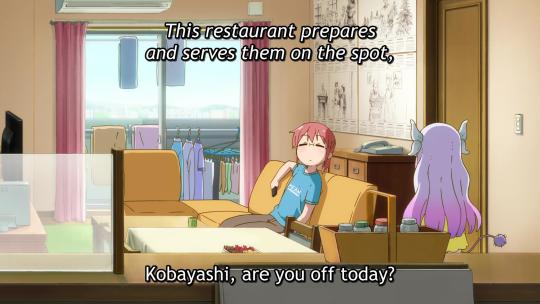
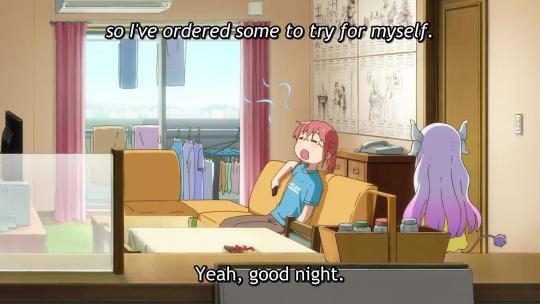
“Kobayashi, are you お休み today?”
“Yeah, お休み.”
お休み o-yasumi, is a noun form of the 休む yasumu, to rest. The word has a variety of applications, as we see here. A day off work/school, i.e. a rest day? お休み. Want to say “good night” to someone before bed? Also お休み.
In this case, it’s not even necessarily clear it’s being said as a pun; as mentioned earlier, repetition is a common feature of the language, so despite the yawn there wouldn’t really be any reason for Kanna to think Kobayashi was about to go to nap or anything.
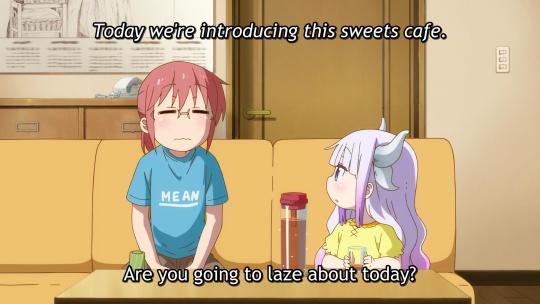
“Laze about” here is だらだら dara-dara, another phenomime (擬態語 gitaigo in Japanese)—one of those words that mimics the “sound” of an idea/concept/state, which don’t actually make a sound per se.
These phrases aren’t necessarily childish or anything (overuse of them can be, but you can find them even in news articles and political speeches for example). They are, however, used frequently by children, and by adults talking to children, as they’re very “easy” words: they’re expressive, they capture useful daily-life concepts, and they usually roll off the tongue. You’ll notice, for example, that Kanna uses them a lot.
Kanna has a very interesting way of talking actually, which I’ll touch on a bit more later.
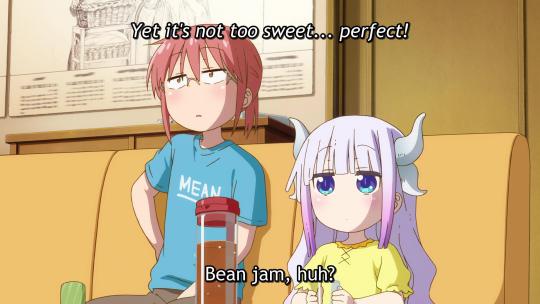

Kobayashi’s “bean jam” here is あんみつ anmitsu, a traditional Japanese dessert (technically a spinoff of mitsumame). It typically is a mix of red beans (and/or red peas), agar (an algae-based gelatin equivalent), some fruit, some variety of rice flour product (shiratama in this case, similar to mochi), and a syrup (often black sugar based).
You can find it year-round, but it has a strong summer association and is even used as a summer season word. (It’s typically chilled and you can often get it with ice cream as an ingredient.)
It’s also sometimes paired with a green-tea flavored something as well (e.g. ice cream, agar, or syrup). The trinity of green tea, red beans (aka azuki), and shiratama makes what I like to think of as the “Japanese S’mores Flavor (for Adults)”. No I will not elaborate on this.
I will though point out the shaved ice flavor Kobayashi ordered later in the episode:
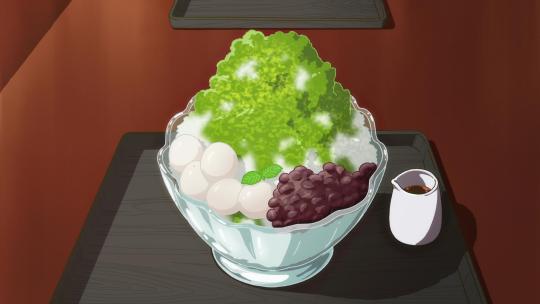
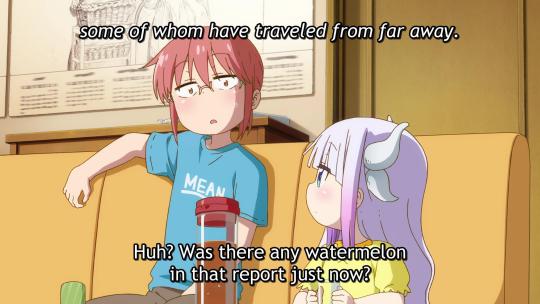
え?今スイカ様子あった?
A word of note here for language learners is 様子 yousu, which has a lot of definitions, but in cases like this where it’s attached to a noun or phrase means roughly “the appearance of __” or “an indication of ___” etc. In actual use, it typically means something that makes you think of whatever ___ is—or the lack of something that would make you think ___.
For example here, it’s like “Watermelon? Where’d that come from?” (since the TV was talking about a different dessert-y food entirely).
Or an unrelated example: “I think that guy is hiding something” → “Really? I haven’t seen any yousu of that.” In other words, it can be a lot like “sign,” as in “I’ve seen no sign of ___.”
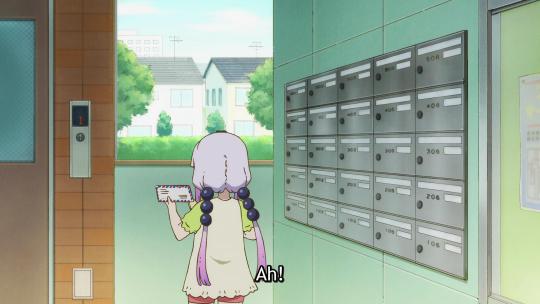
These color-bordered envelopes (originally colored based on the flag of the country of origin) used to be the standard for air mail, domestic or international, though they haven’t been required for several decades.
That said, they’re still popular for that “ooh, international mail!” feel (at least in Japan) and you can buy them at most places that sell stuff like envelopes. As here, they’re often used in media to immediately convey that a letter came from outside Japan.
Kanna (and Kobayashi) says エアメール, lit. “air mail” in English, which is used colloquially for international mail specifically, rather than “mail sent by plane.”
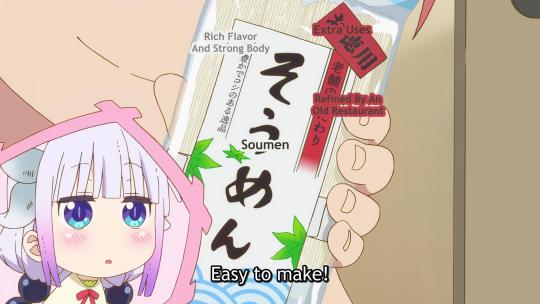
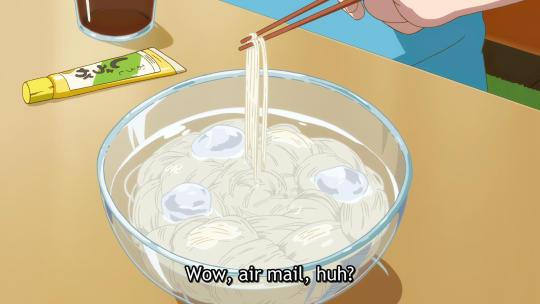
They’re having what’s called 冷やしそうめん hiyashi soumen, chilled/cold soumen for lunch here. (Soumen being a thin wheat noodle; udon but thinner.) As Kanna says, it’s very easy to make!
Basically you just boil it, wash it in cold water, add ice, get some sort of sauce to dip it in, and you’re done! It’s a popular quick meal in summer, and much easier than the more involved nagashi soumen setups you may have seen elsewhere, where they slide the noodles down a chute for you to try to grab and eat. (It’s basically the same meal aside from that though.)
(You can of course add more to it, but as we see here, you don’t really have to.)
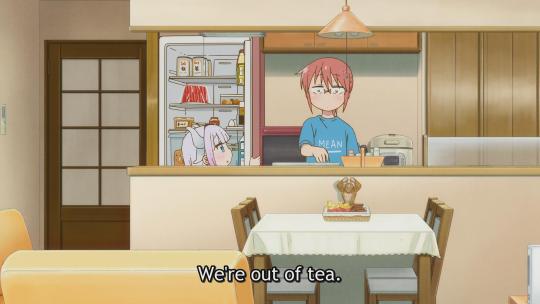
The type of tea here, for the curious, is 麦茶 mugicha, barley tea. Mugi is the general name for cereals/grains including wheat (komugi), barley (oomugi), rye (kuromugi or rye mugi), and oats (enbaku or oat mugi). It’s incredibly common in Japan (and much of East Asia), where it's the household summer drink.
It has no caffeine like many other teas, and has a bunch of various nutritional benefits, so it’s considered a good way to stay hydrated as you’re sweating buckets in the muggy Japanese summer weather.
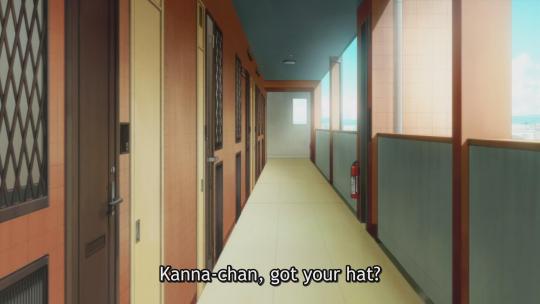
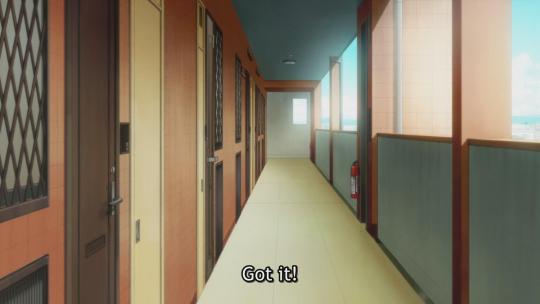
帽子した? boushi shita?
した! shita!
I thought this was a cute way of phrasing this question/answer, and a good example of the “parent and their young child” way these two talk.
The suru (past tense shita) verb used here is the ultimate in “generic verb,” and it basically doesn’t get any simpler grammar-wise to phrase something as “noun+suru” like Kobayashi does here (even the particles are dropped).
Kanna, for her part, doesn’t respond with a “yes” or etc, but instead just repeats back the verb itself in confirmation.
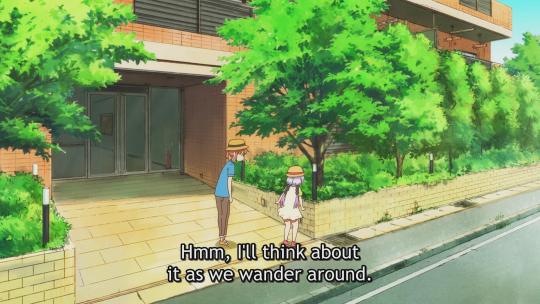

Just to note another one of those words like dara-dara: bura-bura, used for things like wandering around, doing something (or nothing) casually/aimlessly, or (with one bura) for something dangling/swinging in a more literal sense, like a spider, slack yo-yo, or wind chime.
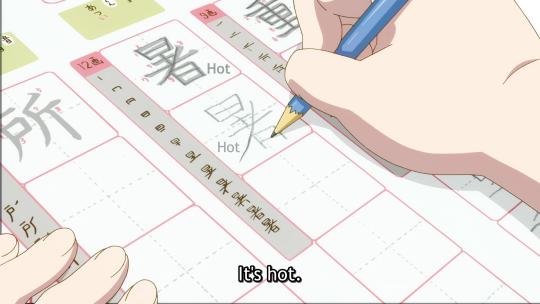
These booklets are a common homework assignment for practicing kanji; you can see along the left side there it shows the stroke order, with the first block giving an example to trace over & showing where to start each stroke.
Each character is made up of radicals (e.g. “hot” above: 日 and 耂), which each have a standard way to write them. There’s 214 such radicals (though many are pretty niche; only about ~50 of them are needed to make most characters), and once you get a hang of them it makes learning new characters much easier (not too different from learning word spellings in English imo).
Kanna is repeating out loud the reading for the “hot” character as she writes it.

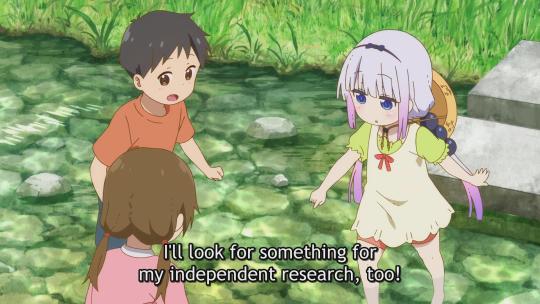
In addition to the above workbooks (which usually involve both kanji and math problems at Kanna’s grade), elementary school summer homework in Japan typically involves doing an illustrated diary (not a daily one necessarily) and some sort of research project about a subject of your choice. (Think kind of like a small science fair project).
The “research” project part is pretty expansive, and you can typically even do something more arts & craftsy for it.
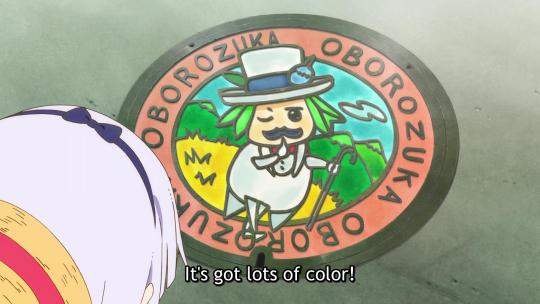
Manhole covers in a lot of Japanese municipalities feature art representative of the area. For example, the city of Chofu, where the author of GeGeGe no Kitaro lived most of his life, has several with art of that series.
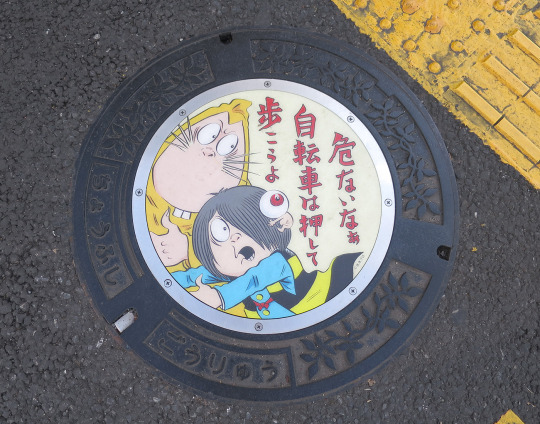
(Photo from https://www.gotokyo.org/jp/spot/1734/index.html)
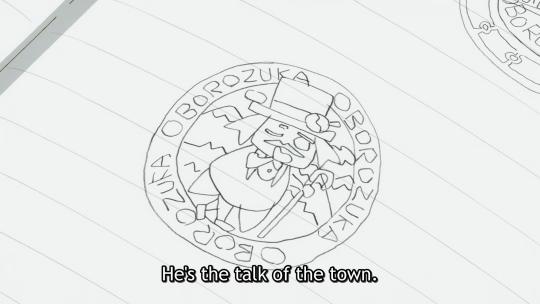
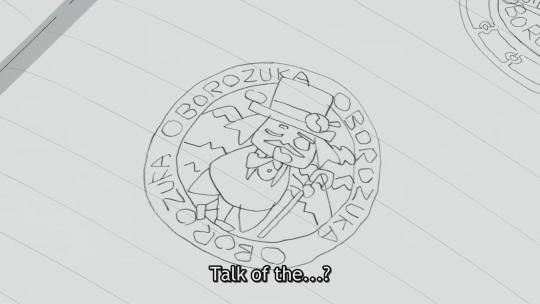
I mentioned earlier that Kanna has an interesting way of speaking. Probably a better way to put it is that she has a pretty convincingly childish way of speaking (despite the monotone). That is, she uses simple grammar and “easy” words most of the time, but then throws out random big words and fancy idioms from time to time that make you go “...where did you learn that?”
In this case, the phrase she uses is 巷で人気 chimata de ninki. Chimata originally means like a fork (in the road), and since those are often places with lots of people passing through, it expanded to mean “the undefined place where people talk about ~stuff~.” So it’s used for “many people are saying~” or “word on the street is~” types of situations (or “talk of the town,” as here).
It’s kind of an “adult” word though; for example the character for it isn’t included in the jouyou kanji (the 2000+ that are taught in elementary through high school). Hence Kobayashi’s reaction here.
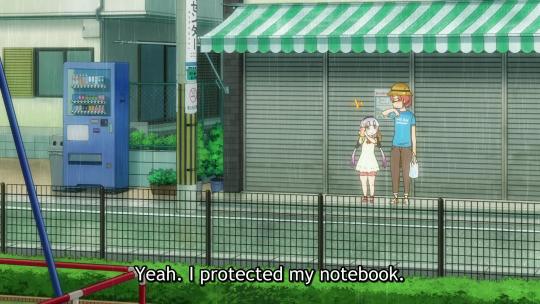
The word she uses for “protected” here is 死守 shishu. The word is the combination of the characters for “death” and “protect,” ~meaning to protect something even at risk to one’s life (to the death, as it were).
It's a word that you learn in third grade in the Japanese education system—the same grade Kanna is in!

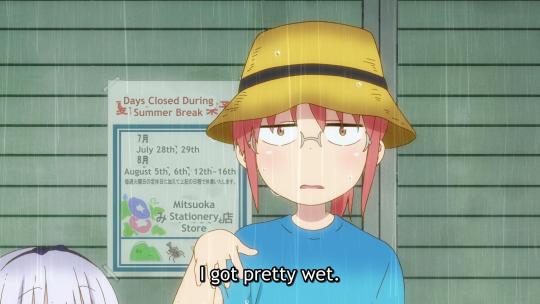
Both of these types of signs are common sights in residential areas like this: depending on where you live, it can feel like there’s always some sort of construction project going on, and Japan’s many family/individually-owned businesses like this tend to be closed on various extra days during the summer (and certain other times) to allow for time off.
In this case, them being closed August 12th~16th implies they’re taking off for Obon (and probably leaving town to visit family).
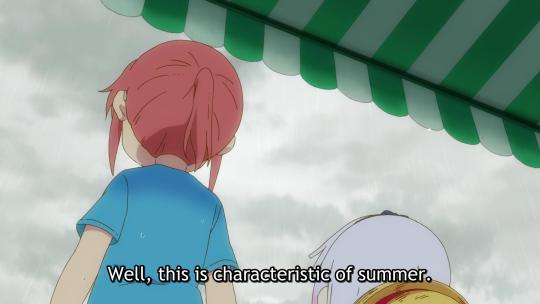
The word Kobayashi uses here is 風物詩 fuubutsu-shi. Fuubutsu refers to something that makes up part of the “scenery” of a place or season, in a pretty broad sense. This shi typically means “poem.”
So fuubutsu-shi is originally a type of poem celebrating a season or a scene of natural beauty, that sort of thing. From that, it’s also now (more popularly) used to describe things that are representative of a season; the kind of stuff you say “it’s not winter until…” about, or “you know it’s summer when…” (It can also be used for places + seasons, like the ice sculptures of Hokkaido winters, or even summer Comiket in Tokyo.)
They’re very similar to the season words I’ve mentioned previously, though they’re far less strict about what counts as one. Here, Kobayashi’s could be referring to the whole package experience of “having to take cover and wait out a sudden heavy rain, despite it being mostly clear skies a few minutes ago,” which you could call fuubutsu-shi (summed up probably as like 夏の雨宿り etc.)
In contrast the relevant season word here would probably be yuudachi (or niwaka-ame), a word referring to the short, sudden bouts of rain that tend to fall (from cumulonimbus clouds, the makings of which are noticeable in the backgrounds before this) on summer evenings.
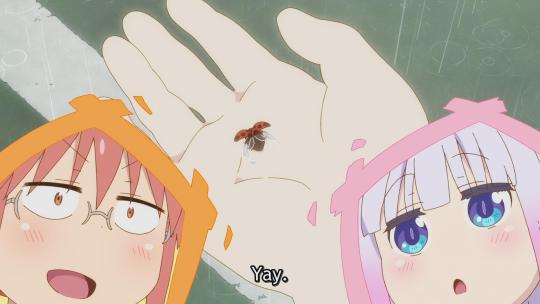
Feels like in season one she woulda eaten it. Three cheers for character growth!
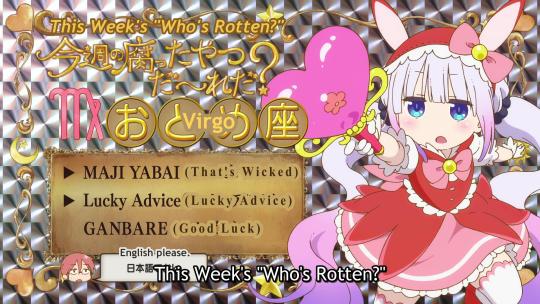
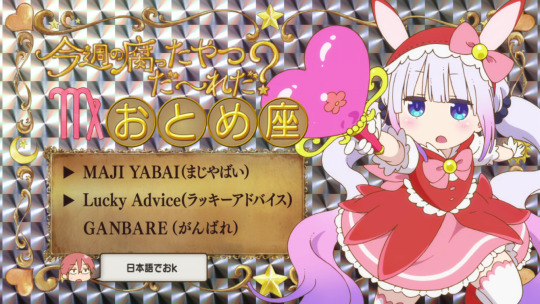
The parentheticals there are just the “English” in hiragana/katakana.
Kobayashi’s comment (nihongo de ok, roughly “you can just use Japanese”) is an internet-born term people originally would use to reply to someone who said something that didn’t make any sense, had terrible grammar, or was so full of katakana loanwords it was hard to read etc.
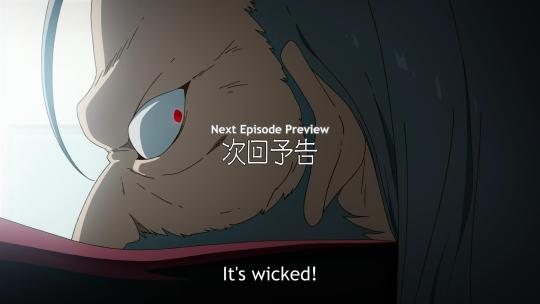
Kanna says this line in English, and while I have no proof at all, my guess is that the specific choice of “wicked” was taken from the translation of “maji yabakune?” used in season one.
13 notes
·
View notes
Note
I've seen your speech pattern analysis on Flash characters. I was wondering if you had any advice on how to create speech patterns for OC characters?
oh heck this is one of the coolest questions i’ve ever received.
i’m gonna try not to go overboard/overwhelming and just give a bit of advice, and then if you want more details please come back and follow up!
There’s a few things to think about up front with character voices / speech patterns. The biggest and most obvious is language and cultural background. The second is personality. The third is personal history. Fourth, briefly, is gender. And the final one I’d say is idiosyncrasies to avoid ‘same voice’.
Culture and Group Dynamics
Depending on the setting, there’s a decent chance you’ll be writing characters from different cultural backgrounds. Even if you’re focusing on a single culture, there will be subcultures. Even if you’re focusing on a single narrow group of people, there will be age and generational differences.
Think about where your character is from. If it’s a fantasy world, that’s still (and even more, in some ways) important. What country, what ethnicity, what mother tongue? Did they grow up urban or rural? High socio-economic status or working class? What sort of educational background and peer group did they have growing up (and presently) and how does that factor into their vocabulary and mannerisms, if at all.
All of these can influence how people talk. There are regional accents and different modes of speaking to signal your group membership. There is code-switching across groups, for those who have had to learn multiple linguistics codes to survive and thrive in society.
How much slang does this group and therefor this character use? What references (modern, outddated, topical, etc) do the rely on? What kind of references (pop culture, music, academic, etc)? What colloquialisms and proverbs do they say? Are these the same or different to their characters, even within the same culture, subculture, or group, and is it because they’re from a different place/sub-group or because of their idiosyncrasies?
You can use these to help your reader get to know more about your character’s background without having to spell it all out directly. Speech patterns and style are a great way to show instead of tell when it comes to details that are hard to drop in organically in other ways.
An important caveat: don’t write a bilingual character who switches languages in speech unless you’re ready to do a bit of research on that. In AATJS I did an absolutely horrific job of this because I was thinking more about fronting the fact that character was Italian rather than thinking through how people actually talk, and it came out exotifying and embarrassing. It’s important to make sure that the way you use language to bring in a character’s cultural and/or ethnic background feels authentic and manifests is a way that respects that language and its users. You can write a character with a complex cultural history without using multiple languages if you’re unprepared to do research and talk to bilingual speakers.
Personality
Probably the most salient thing in a writer’s mind when they’re trying to write character voices: is this the funny character? the serious one? the brainy one? etc.
Don’t overuse stereotypes and archetypes for creating speech patterns (or characters in general) if you’re trying to make a rounded, 3-dimensional character. Instead, go about three levels deeper.
Think about whether they’re introverted or extraverted, whether they are neurotypical or neurodivergent, whether they are introspective enough to express their own emotions clearly or whether they stumble when asked why they did a particular thing or feel a particular way (most people don’t or can’t clearly articulate exactly why they did something or how they feel, and come at things a bit sideways to circle around their motives and interior realities when pressed to make them external and concretely verbal).
Is this character calm, is their voice soothing, do they speak slowly? Are they excitable and loud and is their speech free-flowing? Are they angry? Do they swear? Do they use references for humour or are they more into puns? Do they laugh at their own jokes? Do they talk with their hands?
This character has social anxiety: how does that manifest in her speech? Does she clam up and get very quiet when she gets nervous, or does she go rapidfire and a little too loud (does she process by turning in or by distracting herself by turning outward)? Does she get very careful and deliberate in choosing her words (is she a bit high-strung?)? Ask yourself which fits best with the other elements of her personality and what you want the reader to know/interpret about her.
This character is incredibly smart and a bit awkward: how does that manifest in their speech? Do they tend to use 5-dollar words, or do they expend a lot of energy choosing their words more carefully (how considerate are they to their audience when speaking and does that influence their speech)? Do they stumble over their words and explaining things, or are they good at making points with clear language learned from a lifetime of tutoring and helping others?
This character is the bff, who tries hard to make sure everyone else is happy first: how does that manifest in his speech? How does he switch between his happy-mask versus his more authentic self, and what changes in tone, word-choice, and inflection come in when he does?
-
Personal History
I’m only drawing a distinction between this and personality (archetype, really) so that I can draw attention to ways to add simultaneously unique and shared layers to characters that are distinct but related to group dynamics.
Here’s sort of what I mean: the level of education of a mother (or primary caregiver) of an infant can determine that infant’s vocabulary size. While we can break down all the ‘why is that’ layers to this, the one I want to point is to the simple truth that the more education a person does, the more specialized language they end up learning over time. This doesn’t have to be formal education though -- the more you learn about something and the more you read and access new knowledges and perspective, the more and more words you learn, and then if you start using those words, they trickle down to those close to you.
So.
What’s your character’s educational background? Is it the same as their friends who you are also writing? Is the same as their family’s? How does this character’s family influence their speech? Are they formal, informal, warm, authoritative?
If you’re writing siblings, they’ll have some shared things! But also some very different ones! Me and my sister talk nothing alike in terms of vocabulary, but a lot alike in terms of mannerisms whenever we spend a bit of time together!
If your characters grew up around each other, they’ll have a lot of the same references. People from the same cities or regions will have things specific to that region, either due to sub-culture effects or because of local references.
The city of Calgary, Canada for instance has the Plus15 which are a connected pedway system between the buildings in downtown, so named because they are 15feet above the ground. Drive 3 hours north to the city of Edmonton, and you have an underground pedway just called the pedways, no special name. Go a few provinces east to Toronto and their underground pedway system downtown is called PATH. These are all known to locals and part of the vernacular, but are opaque to people outside those cities. And the whole idea of them is probably opaque to people who aren’t from super cold cities that don’t require building-connecting pedway systems for pedestrians to get around high-density areas like downtown (or university campuses) without going out into the cold.
Friends, families, and groups are like that too. In-jokes, shared histories, speaking in references. What are your characters’ relationships to each other and how does that history influence the way they approach talking to each other?
-
Gender
I don’t want to spend too much time on this one because ugh, gender. What even is it?
But like it or not, it has an impact on our speech patterns. There are cultural and societal norms in how men and women are likely to speak, and breaking those norms will be noticed regardless of whether you’re trans, enby, queer, or not. There are norms that people who are queer may fall into as well, sometimes without even noticing at first. A lot of these aren’t about word choice per se but instead about mannerisms and tone and body language, but some overlap or are specific to language.
Speaking in broad generalizations here, women use more emotional language and tend to speak with more hesitancies/qualifications. So more “i think, i feel” and less “it is”. More conversations that front emotions and dig deeper into those, with longer sentences to explain in detail. The obvious caveat is that personality matters more (i.e., is this a person who likes to talk about their emotions in detail or not) but it is something to consider because there will be general but subtle differences that you can use to help further distinguish your characters’ voices.
Sidenote: this can also be exacerbated by different cultural backgrounds and languages (a simple example is Japanese which has different words for “I” depending on your gender as well as your personality, familiarity with the other persons in the conversation, and situational appropriateness, so interesting ways that gender and social expectations intersect in language).
Anyway this isn’t typically a huge problem except that I’ve found that a lot of writers have a tendency to overgeneralize the speech patterns that fit with their ascribed gender due to early-life socialization, or conversely to overgeneralize patterns that fit with their gender identity (when not cis) either due to heavily identifying with their gender identity’s speech model (or sometimes possibly due to a knee-jerk sort of backlash). I say this as an enby who both struggles with it and notices it and tries to edit and correct for it.
I could get into all sorts of examples of ways this can lead to voice issues, but in general i think the point here is to make sure you’re writing any given character in view of that character’s personality and history, with gender only as a modifier for how some of these might come out in subtle ways but which can be important to help tell us about your character (and if you’re writing queer characters, it’s all the more important to consider how their relationship with gender and socialization might impact which speech models and styles they identify more with).
-
Idiosyncrasies
So, you’ve got a character. You’ve got their personality and history down. You know how they manifest in their speech. And you’re still getting some ‘same voice’ issues.
People really are unique snowflakes. Let that be reflected in their speech.
This person uses contractions differently than that one. This one says “ain’t” and that one says “isn’t.”
This person makes Simpsons references and that one doesn’t like Simpsons, and makes Brooklyn Nine Nine references instead. That other one doesn’t use referential humour much at all. This one loves old movies and hasn’t seen any of the new stuff so they make references all the time but no one ever notices.
This one loves the word “excoriate” and that one doesn’t even know what it means because what the hell, who uses the word excoriate?
This one talks about food a lot, it overlaps with their interests. This one uses metaphors. This one grunts in response. This one exclaims. This one says “like” and that one hates it. That one refers to themselves in third person. This other one uses reflective language an usual amount (e.g., “love me some candy”). This other one keeps misusing the word inconceivable and that one speaks almost without contractions but still comes off as more charming and humorous while correcting him.
I have an aunt who says “girl” or “girlfriend” a fuck-ton and she has been my whole life and I don’t know why because none of her sisters do, but she does and it annoys me so much the way she says it. I swear a lot when I’m feeling casual despite never ever doing it in a professional or even slightly-less-than-relaxed space, so the idiosyncrasy of comfort levels has a massive impact on my vocabulary in ways which, I promise, almost no one who meets me first in a professional space expect.
Let your characters be individuals and try to make them as unique as possible without overdoing it, or over-relying on a single verbal tendency or habit.
-
And ... that’s all I’ve got for now. Completely failed at being concise. I meant to give like 2-3 bullet points or examples for each, not paragraphs, but here we are. That’s one of my verbal tendencies: long flowing verbosity :)
Hope this helps!
#speech patterns#speech analysis#phyn writes#writing advice#writing#OC's#writing reference#didn't edit so apologies for typos i'm sure i'll come back at some point#Anonymous
54 notes
·
View notes
Text

DAPHNE BLAKE + INTELLIGENCE & KNOWLEDGE :
While Daphne is historically looked down on for not “contributing anything” to the team, something I’ve loved about the more modern interpretations of the Scooby Doo series is the effort made to give her things to be good at, and to be knowledgable about which would make sense for the others not to. As a result, Daphne’s background as a rich, educated young girl with a high-society family that has reach means she knows a lot about very obscure or random topics.
As a non-exhaustive list of some of her biggest interests:
CHEESES & THEIR HISTORY ( as seen in Mystery Incorporated Season 2, Episode 17 )
FASHION HISTORY –– She may not know a lot about the Gettysburg Address, or whatever happened with the founding fathers, but Daphne’s supremely intelligent and great at retaining information about fashion history and its accuracy. She probably has a cousin in California who works as a Fashion Historian Consultant on historical shows & movies. Let’s name that cousin AJ BLACKWELL.
ABSTRACT ART
CHEMICALS & BIOLOGY –– like someone such as Elle Woods ( reference HERE ), Daphne’s knowledge of Chemicals and Biology comes from her interest in makeup and its effects on the body. She knows, for example, a lot of big words and names for the chemicals used in lipsticks, and what to avoid putting on your skin etc. She knows how the skin, as an organ, functions –– she could probably be a freaking Dermatologist if she wanted to be, honestly. Some of this knowledge is researched, while a lot of it comes from her family members, and even more so, from her connections to the makeup industry, and to doctors ( being as her sister is one [ a neurobiologist ] herself ).
On top of this, there’s also the many hobbies that she’s had in Be Cool, Scooby Doo which indicate Daphne as a sort of Jack of All Trades who can very easily pick up many different skills like JUGGLING; PUPPETEERING, etc.
A lot of Daphne’s obscure knowledge comes, like I said, from the people she knows. Unlike someone like Velma ( and this isn’t a slight against her ), Daphne’s knowledge comes from living, and socializing, and learning from experience, and from others. Yes, sometimes it comes from research, but if, per se, she knows something about a very specific sub-species of spider, it’s because her parents went on a hunting trip in the summer to Paraguay and got bit by one. She’s great at remembering things and storing them away. And it’s part of what makes her so freaking smart.
Furthermore, while this post is primarily about mainstream Logical-Mathematical Intelligence, if we were to look at the different kinds of intelligence she excels at –– the most obvious one being INTRA-PERSONAL & INTERPERSONAL INTELLIGENCE ( though as a teenager, she isn’t always the best at that either ) –– she is also gifted with:
MUSICAL INTELLIGENCE: Having once joined the Hex Girls as a stand-in singer for their lead, Thorn, Daphne possesses an understanding of music at least instinctively. While she may not be able to read music or have a huge learned understanding of Musical Science and Theory, she’s naturally gifted musically.
LINGUISTIC INTELLIGENCE: Daphne’s a people-person. She’s very charming and knows how to use her words to influence people; get them to trust her; comfort them, etc. She’s canonically a journalist and news reporter, and as such has to be either on air on short-notice, or constantly writing pieces to air. Therefore, while she might not be a Poet Laureate, she has a way with words.
BODILY-KINESTHETIC: I headcanon that part of the reason Daphne was so clumsy was a sort of… over-awareness of her body growing up ( among other things, mentioned below ). Also, with it constantly growing and changing, Daphne wasn’t always comfortable in it, even if she appeared to be. As a result, it’s not until she’s older and able to receive training that she really feels super comfortable and at ease moving around and defending herself. That being said, she did also receive poise and etiquette training in her youth, so she does have a natural-born grace that just can’t be faked.
And to address the elephant in the room since I said Daphne could be very adept at using her body to her advantage: Yes, my Daphne is clumsy and very much danger-prone, but I don’t think it’s because she lacks grace ( though she sometimes does, hello, ABRACADABRA DOO ) –– I think it’s because she lacks an awareness of her surroundings a lot of the times. It’s what makes her a pretty reckless driver –– she’s aware only of herself and her friends, and her goals, and not necessarily that loose floorboard in front of her.
Finally, let’s also not forget that Daphne has something else that makes her a key facet of Mystery Inc –– something that all the members have: creativity. Daphne is able to think outside of the box. She affords people the benefit of the doubt, she is able to suspend disbelief at times when other’s wouldn’t. In a practical sense, she’s also about to use that creativity to get the gang out of tough situations ( such as when she used a pore strip to unlock a fingerprint ID in Monsters Unleashed )! I think this is actually part of the reason her and Fred are so shippable –– in this regard, they’re both very, very creative.
So, to summarize. Daphne is super smart and awesome.
UPDATED: 01.25.22
2 notes
·
View notes
Photo
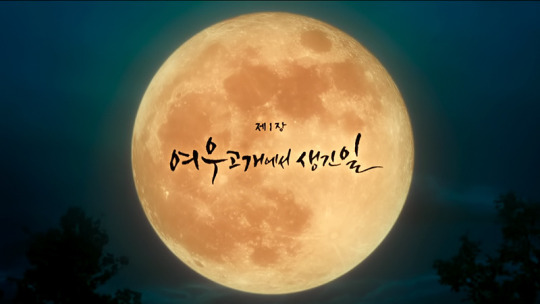
구미호뎐 | Tale of the Nine Tailed - Lost in Translation EP01
In which my sister and I sat down with a pint of mint chocolate chip and wrote down everything that occurred to us while watching the fan-subbed version of TotNT EP01. Contains mild spoilers.
Prologue
We open with an excerpt from the Hyeonjoonggi (현중기・玄中記), which the internet informs me originated in China sometime between 265-317 CE. In Korea in particular, gumiho are typically thought of as being female, but this is an example of a classical text that says they can be either. From what director Kang Shin Hyo said at the TotNT press conference, the premise of TotNT began with the idea of challenging this base assumption by making the gumiho male and placing him in modern-day Seoul. I would translate the passage as follows:
When a fox becomes 100, it can become a beautiful woman, or become a man who has relations with women. A fox that lives for 1000 years communes with the heavens and becomes a cheon’ho (heavenly fox). Its gifts are like that of a powerful shamaness; it can perceive things more than 1000 leagues distant.”
To my sense, the passage was introduced to show precedent for the existence of male gumiho in traditional folklore, as well as to illustrate that foxes over 1000 (cheon’ho) can be closer to deities than monsters.
On to the show. The year is 1999. I’m surprised the subs left ‘Fox Ridge’ untranslated as Yeou Gogae since it seems like it would be relevant information that the place where the accident takes place is somehow tied to foxes.
When the imposter parents (who I believe are also foxes) chase little Ji Ah up into her room and her not-dad says, “You little brat!” (or at least, that’s what the subs we’re watching say), this is an example of what’s called ‘code switching.’ His phrasing is somewhat old-fashioned, which in this case helps to give the impression that he’s not human since it’s the cant of creatures in traditional fairytales. For anyone studying Korean, the line is, “요 년 봐라,” where ‘nyeon’ might mean anywhere from ‘girl’ to ‘wench’ or even ‘bitch.’
Okay, I have to ask. Does no one else in Seoul drive on Fox Ridge? How did Ji Ah have time to go home, get attacked, and then be returned to the scene of the accident (I’m assuming by Yeon) before anyone came across it?
Also, how did Yeon know where to take her? He tells grown Ji Ah that he just happened upon her after catching the scent of blood, but I get the sense there’s more to the story than that. I feel like this is part of a larger pattern wherein Yeon goes out of his way to rescue someone and then pretends as if he didn’t.
Episode 01 Title Card: What Happened on Fox Ridge
According to Yeon’s alarm, our current timeline begins on Saturday, August 29, 2020, and he has a wedding to attend. 2020 yet no COVID19? I guess this really is a fantasy drama. ;p
The BGM playing while Yeon gets ready is called ‘The Fox's Wedding Day,’ or, more literally, ‘day when a fox goes to be married’ (Yeou ga shijip ganeun nal) and it’s actually Yeon’s theme. I was expecting his theme to be the track entitled ‘Gumiho,’ but I guess not lol
The sun-shower. In both Japan and Korea, a sun-shower is known as ‘a fox’s wedding’ (kitsune no yome-iri/yeou ga shijip ganeun nal), so this is already cluing us in that the bride is a fox (I say ‘bride’ because both these phrasings typically apply to a bride marrying into her husband’s house. The phrasing is different for grooms, who ‘receive’ the bride). This is what Yeon means when he arrives at the wedding hall and says, “That’s because a fox is getting married today.”
It’s strange to me that the bride’s identity has completely dropped out of the subs. She’s Yeou Nui (literally ‘fox sister’), a folklore character of the Brothers Grim-style horror school of fairytales. Her thing is that she’s a gumiho who preys on families with only sons who desperately want a daughter. She insinuates herself into their lives, brings calamity down upon them, and finally, eats their livers. Like most fairytales, there are many permutations of her story, but many of them feature her saying she’s consumed 999 livers. I understand where - absent this context - some people might have seen Yeon as the bad guy here (spoiler: he’s not).
The subtitle here for Yeon’s line says: “But you need to know that changing your identity isn’t as simple as you think.” What he literally says is:
Yeon: How did you go to ground so completely? You think that if you change your face and your identity, your blood-stained past will change too, right? But changing lives isn’t as simple* as changing subway lines. [*Note: ‘simple’ is in English]
This is the first real dialogue we get from Yeon, and one thing it’s doing very intentionally is showcasing just how much he’s adapted to modern life. It does this both with the content of what he says (talking about changing subway lines), as well as with the amount of English loan words he tosses around. So I personally would have kept the bit about the subway in if I had been translating.
Yeou Nui’s line was translated as, “Please forgive me,” but it should more properly be, “Spare me,” or “Let me live.” Yeon is an enforcer, not a judge. (Also, ‘forgive’ is another word entirely).
Yeon’s line that’s subbed, “Listen, you fox. How could you dare dream of having a happy ending after eating so many livers?” is the result of what’s called diagonal translation, which is an unfortunate side-effect of subtitling conventions. What he literally says is:
Yeon: Yeou Nui, after eating the livers of countless adoptive parents and older brothers* how can you dream of a happy ending?
[*Note: The word he uses for ‘brothers’ here is 오라비들, which is a semi-antiquated word, and again, the sort of language used in folktales]
Yeon’s line, “Here’s a piece of advice” is more literally, “Here’s a bit of advice stemming from experience,” which is the first hint we get in-drama that he’s been in a similar position.
Nam Ji Ah
We get our first introduction to adult Ji Ah as she narrates the script she’s editing for her TV program on her way to the wedding hall. When Jae Hwan worries about her changing the script without the writer’s permission (again lol), Ji Ah's response translated literally would be:
Ji Ah: Then let’s go with this. PDs’ livers have to be swollen or coming out of their bodies.
That’s a pretty disgusting image in English, so I don’t blame the subs for changing it to something more sensical and less graphic. But as a cultural note, in Korea and Japan, having a large liver means to be gutsy or brave. Ji Ah’s character description similarly describes her as, ‘a woman whose liver is [so large it’s] coming out of her body,’ meaning she’s about as gutsy as it gets.
Okay, call me a cynic, but I loved Ji Ah’s line about not being able to digest wedding food due to the choking atmosphere of forced happiness pfft
Jae Hwan saying, “Who knows? You may meet your destined partner at a place like this,” as Yeon walks by in the background = Jae Hwan unwittingly hitting the nail of the head #1
Lol Yeon acting like a bored kid held captive at a dinner party while the wedding takes place. Bless Lee Dong Wook because I’m sure it’s all ad libbed. I feel like this could be a game: spot the LDW ad lib.
The Wedding Hall Incident
When Yeon returns to her dressing room after the wedding, Yeou Nui changes tactics from begging to putting her hackles up and challenging Yeon. Linguistically, that’s marked by her code switching to an archaic cant. Yeon, however, remains unfazed and responds with the most modern thing possible, completely undermining her bravado:
Yeou Nui: Oh former master of Baekdudaegan, what authority have you to condemn us?
Yeon: Get a hold of how she’s talking (rhetorical). Hey, if it wasn’t for you I would’ve been watching American TV shows while eating ice cream today!
Okay, I love the way Yeon materializes his sword. I thought he was (un-)transforming his umbrella at first, but he later does it with a plank of wood so I assume he can do this with pretty much anything?
On the topic of his sword, I posted a gif set not long ago referring to it as a sa’ingeom (사인검), literally ‘Four Tigers Sword’ (referring to the year, month, day, and hour of the tiger when such swords were supposedly forged). You’ll notice it doesn’t have a cross-guard since they’re traditionally ceremonial swords rather than actual weapons. The first sa’ingeom were made during the reign of King Taejo (1392-1398), but I assume they gave him one despite it being somewhat anachronistic because they’re also said to cut down evil spirits and ward against calamity. Mostly, though, it looks really cool and is very traditionally Korean.
Not for anything, but I love this BGM track that’s playing during the wedding hall fight (‘The Uninvited’). This short action sequence was so great. I wish we could have seen more of Yeon hunting down supernatural baddies. Also more of those gumiho eyes. More gumiho everything in general.
As he stabs her, Yeon’s line to Yeou Nui in the subs was rendered as, “Don’t do something stupid like falling in love in your next time.” I would have translated this as, “If you’re reborn, don’t do something so [useless] as falling in love.” Again, for anyone studying Korean, the phrase is ‘사랑 따위" (sarang ddaui). ‘Ddaui’ means ‘such a thing as,’ and it’s always used to disparage whatever proceeds it. There’s no good way to communicate that disparagement in English grammatically, so I opted for ‘useless’ in an approximation.
The BGM that plays the first time Ji Ah spots Yeon leaving the wedding hall is called ‘White Pupils’ (or literally ‘white eyes’). The imagery typically associated with that is death, so I’m curious what inspired the track title. Maybe they mean ‘white eyes’ like the fortune teller since it’s used at fateful moments?
“Who knows? That may be the story you were destined to cover.” = Jae Hwan unwittingly hitting the nail on the head #2
“Were they mass hypnotized or something?” = Jae Hwan unwittingly hitting the nail of the head #3. Thank you, exposition fairy. ;)
Okay, when Ji Ah and Jae Hwan examine the scene, Ji Ah’s line is subbed, “I need to see what that woman of this love story looks like,” which is ungrammatical in addition to being wrong. What she actually says is:
Ji Ah: I need to see the face of that protagonist of the Romance of the Age. [And I believe the ‘protagonist’ she was referring to is actually Yeon ;) This is bordering on meta, seeing as he’s actually the protagonist of the epic romance that is TotNT]
Kim Soo Oh
The BGM playing while Yeon sits in the park people-watching and then looks pensively at his hand is called, ‘Thread Rings.’ Between that, what LDW alluded to in his VLIVE, and some still cuts I saw of deleted scenes from EP16, I’m convinced there was something more to those rings that got cut due to time constraints. ㅠㅠ
Fun fact: This scene between Yeon and Soo Oh was the first scene of the drama that they filmed.
When Soo Oh asks Yeon what he’s doing there, the sub for Yeon’s response was, “Nothing other than waiting for someone.” That strikes me as off in tone as well as pacing. I would have translated it as, “Just.....waiting for someone.” (which is literally what he says).
When Soo Oh asks Yeon why he’s waiting, the sub says, “Because a fox can only love one person till death.” I don’t really have a problem with that translation, but what he literally says is, “Once a fox takes a mate they never forsake them. Until death.”
Sub: “How are you coping with that?” / “Not well.” > Literally: “Are you okay?” / “I’m not okay.” I actually like the sub here since it better conveys how precocious Soo Oh appears in this scene. He seems to alternate between precocious and adorably dim throughout the drama depending on who he’s with, though when he’s with Rang, it’s mostly the latter pfft
When Yeon turns down Soo Oh’s offer of friendship he says, “Your nose. I’m not big on men with runny noses. And human lifespans are too short to be friends with me.” Yeon's use of ‘men’ struck me as funny since I guess to someone over 1600 years old, an 8 year old and an 80 year old aren’t all that different. Also, Yeon giving serious life advice to an 8 year old is adorable. He talks to him like he’s an adult.
The Afterlife Immigration Office
Between the BGM and the way the camera pans up the endless levels of shelving, did anyone else feel like Yeon entered Hogwarts for a sec? (not complaining) ;)
For the record, Yeon uses banmal with Taluipa and calls her halmeom (granny). In contrast, Hyeonuiong is pretty much the only character Yeon speaks to in jondaetmal and addresses respectfully as ‘elder’ (eoreushin). He speaks to Ji Ah’s parents politely as well, but it’s mainly because they’re her parents.
The text introducing Taluipa’s character wasn’t translated in the version we’re watching but it reads: ‘The god who rules over the River of Three Crossings (Samdocheon), the boundary between this world and the next.’ The hanja for her name (奪衣婆) refer to her traditional role, namely, removing the clothing of the dead for her husband to weigh on the Uiryeong’su (su = tree) to measure the weight of their sins. This is the same tree that the Uiryeong’geom (the wooden sword that appears in EP13), is allegedly carved from.
Lol Taluipa saying she has to keep up with the times but also using a computer that’s positively ancient (come to think of it, it’s probably from the 80s since that’s her favorite decade)
Again, I’m surprised that Yeou Nui’s character name dropped from the subs completely. The subs here just say, ‘the female fox.’
For Taluipa’s line, the subs say, “You’re to obey the order and capture who you’re sent after,” but that’s a loose approximation. More literally, it should be: “If the higher ups say to bring someone in, then you just have to bring them in.” I’m only mentioning it because the line implys that both Taluipa and Yeon report to someone higher up the chain of command. Otherwise they may be misconstrued as Taluipa’s orders.
Yeon’s line, “My compulsory military service has gone on for 600 years. How could I not go crazy?” is hilarious when you consider that Korean men are required to complete 2 years of military service, and even that often feels like an eternity, so I think for any Korean, the idea of 600 years of it is just exceptionally cruel. The line is iconic enough to have been included in Yeon’s character profile.
I noticed this a while back, but ‘mountain god’ is being consistently translated as ‘mountain spirit.’ Technically, Yeon is (was?) a god, if a low ranking one in the grand scheme of things (the Korean word is ‘sanshin’ where ‘san’ = mountain and ‘shin’ = god). I understand the use of ‘spirit’ though, since he’s not a god as gods are typically thought of in western mythologies.
Lol Yeon sticking his fingers in his ears (I would bet money this was also an ad lib)
Taluipa has a line that’s subbed, “Foxes never stay in debt.” More literally, it should be, “They say foxes repay eunhye no matter what.” You can find my explanation of eunhye here.
Wow, the subs really dropped the humour ball on Taluipa’s line here. First off, she says, ‘Right now’ in English. And while the sub says “Do you want your freedom back?” what she literally says is. “Do you want to be discharged?” (since Yeon had just likened his duties to military service).
On his way out, Yeon actually tells Taluipa, “Halmeom, you’re going to go to hell” (which is not the same as the underworld/afterlife as it said in the subs. Taluipa’s job is literally to ferry souls, so she goes to the afterlife all the time anyway). Also, when he says “I’ll pray for it everyday,” his phrasing is that of an elderly person pfft
As I mentioned, Yeon speaks formally to Hyeonuiong, who in return affectionately calls him Yeon-ie or Yeon-ah, which I find adorable.
Lol I’m not used to Ahn Gil Kang playing such a friendly character. Seeing him wheedle Taluipa with aegyo is hilarious.
Code Red
Somewhat of a side note, I can’t help but wonder, is Shin Joo’s last name ‘Gu’ because he’s a gumiho, a la My Girlfriend is a Gumiho (2010)’s Gu Mi Ho-ssi?
I wish the subs had just left ‘Lee Yeon-nim’ as-is, instead of changing it to ‘Mr. Lee.' As a general rule, I’m in favor of preserving character forms of address when translating.
Personally, I would have translated the name of Ji Ah’s TV program as: ‘In Search of Urban Legends’ rather than ‘Unveiling Urban Legends.’
I really like the dynamic between Ji Ah and writer Kim Sae Rom. “Should we fight?” / “Yeah, let’s fight~” How great is it that this drama doesn’t have a single catty, bitchy, stuck-up or otherwise obnoxious female character?
For anyone keeping track, Shin Joo speaks to Yeon in jondaetmal while Yeon speaks to Shin Joo in banmal, underlining their master/retainer dynamic.
Side note: There are actually multiple ‘types’ of jondaetmal: what I think of as ‘neutral polite’ (i.e. simply adding ‘yo’ to the end of all your sentences), the more formal polite (i.e. ending with ~[seu]mnida), that which elevates the subject, and that which lowers the speaker. The interplay of the four allows for varying degrees of politeness. The way Shin Joo speaks to Yeon is pretty much the highest degree. That doesn’t mean they aren’t close. Polite language can indicate distance but also level of regard irrespective of distance. This applies to Rang and Yoo Ri as well.
Again, Shin Joo calls Ji Ah ‘PD-nim’ but that became ‘that female director’ in the subs. PD-nim is a respectful (and non-gendered) form of address, and it’s perfectly suited to Shin Joo’s genial and deferential personality, so I wish the subs had just kept it.
I read an episode recap where the recapper mentioned she wasn’t sure what Shin Joo’s deal was. At the time I was confused, but now I think I get it. In the subs, Shin Joo says, “When I’m a seasoned veteran? I’m now up to the point where I’m wondering if I’ve turned into an actual person.” What he actually says is:
Shin Joo: No way~ How long have I been living in this (the human) world? Recently, I sometimes even have an existential crisis wondering, ‘Am I a person or a fox?’
[So he flat out says he’s a fox here, but that wasn’t reflected in the subs.]
Fun fact: this was Hwang Hee’s first scene that he filmed with Lee Dong Wook, and the BGM as they exit is Shin Joo’s theme.
I love the way Lee Dong Wook played this scene where they pay their tab. That is all.
It’s only as Yeon and Shin Joo exit the restaurant that we see that the sign out front reads ‘The Snail Bride’ (Ureong Gakshi). This is another folktale in-joke, since the snail bride’s whole thing is that she cooks delicious meals for her human husband everyday.
For the record, the Snail Bride (Bok Hye Ja) also uses honorific language towards Yeon and calls him ‘Lee Yeon-nim.’ I just assumed it was in deference to his ex-mountain god status, but it turns out she has a personal reason for holding him in high regard as well that we discover in the final episode.
As Yeon and Shin Joo walk away, Shin Joo’s line is subbed, “That show’s actually quite famous.” Since Korean doesn’t require a subject, the sentence is somewhat ambiguous, but I understood him to be referring to Ji Ah herself rather than the show since he says: “[Something is] really famous around the broadcast station.”
Lee Rang
Lol Kim Beom. How are you 32 years old?
I love how sharp and no-nonsense Ji Ah is. It’s so refreshing to not have to wait for the characters to catch up to what the audience already knows.
Rang’s theme that plays as he transforms back into his suave self is so iconic. The music director (Hong Dae Sung) really is a genius. It’s funny when you think about how different Rang’s theme is from Yeon’s.
Fun fact: Kim Beom shared in his Instagram LIVE that Rang ‘picking the wrong shoes’ was actually intentional. He was testing Ji Ah to see if she’d notice.
Okay, Rang says here that he likes, “everything about her (Ji Ah) from head to toe,” (not in a romantic way but in a grudging respect/she’s fun to toy with kind of way) but what happened to that? Are we supposed to assume that he would have liked her if she hadn’t been the object of his brother’s affection? But he approached her knowing that’s who she was...? I don’t know. I do know I wish they’d had more scenes together. Their verbal sparring is great.
Side note: One Korean fan nickname for Rang and Yoo Ri that Kim Beom liked was ‘Hoket-dan,’ playing off the Korean for pokemon’s ‘Team Rocket’ (Roket-dan) and mashing it together with the ‘ho’ from ‘gumiho’ haha
Yeon’s obsession with mint chocolate ice cream is a hilarious counterpoint to his status as a cheon’ho and his ex-mountain god title. Point to the writer. In Japanese, this would probably be called ‘gap-moe’.
When Yeon tells the man behind the counter, “When I’m indebted to someone, I’m obligated to return the favor,” he’s once again talking about eunhye. As a fox, he’s supernaturally bound to repay good deeds done for him. As far as I’m aware, this is unique to the drama and not part of the traditional gumiho lore.
Yeon eating ice cream like a happy kid XD Lol Lee Dong Wook, how are you 39?
Fun fact: Yeon’s line when he answers Rang’s call, “The number you have reached doesn’t exist, you punk” was an ad lib by Lee Dong Wook. The combination of the formal phrasing found in a typical voicemail recording followed by ‘you punk’ is particularly funny. It’s so witty I actually wouldn’t have known this was an ad lib if LDW hadn’t confessed as much himself.
“Let’s meet.” / “I refuse.” / “I’ll set your house on fire.” Hahaha What is with these brothers? Are they 1600+ and 600, or 16 and 6? Are the zeros silent??
Bus 1002
Ji Ah: “If possible, pick a different dream. I’ve been on the clock for 22 hours straight now.” I like Ji Ah so much. She’s unpretentious, intelligent, honest, driven, resourceful and witty.
Lol As Ji Ah struggles with the old man, you can hear Yeon offscreen urging the driver to get moving. Only he calls him, ‘driver yangban.’ Yangban is originally a word for a nobleman, but much like the word ‘lady’ in English, what was once a term of respect is now...not. lol Also, I’m pretty sure this was another ad lib by Lee Dong Wook since it happens entirely in the background.
This scene with Ji Ah piggybacking the old man is so classic spooky-folktale. I love it.
"You’re the only person I saw.” *Close up of the totem pole* They managed to make that whole sequence creepy despite nothing actually happening. Cool cool cool.
So our old drunkard is revealed to be a Mokjangseung (mok = wood). Jangseung in general are totems that stand at crossroads and the entrances to villages. tvN published some backstory info explaining Ji Ah’s past with this particular Jangseung and why he elected to save her which I translated here.
Aaaand we’re back at Fox Ridge. I can’t believe I only just noticed this, but the episode title could refer equally to the accident in Ji Ah’s past and this bus accident in the present.
Of course Rang staged the accident at the site of Ji Ah’s greatest trauma. Also, the fact that he knows that about her is telling.
Appropriately, the BGM playing as Ji Ah arrives at the scene of the accident is ‘Fox Ridge’ (Yeou Gogae). Iconic.
Back over to Yeon. The first time I watched this I wondered where on earth he was heading in that downpour but it turns out he was in pursuit of Rang, who had given him the slip.
Seeing Yeon limping injured through the rain ㅠㅠ Also, while Yeon later tells Ji Ah he carries his umbrella everywhere because he hates his fur getting wet, he clearly isn’t bothered here, choosing to keep it sheathed on his back instead. I guess all bets are off when he’s in Gumiho Mode.
Detective Baek and Ji Ah speak in banmal and he calls her ‘Nam Ji Ah,’ which I assume means they’ve been friends for a while.
Wow, good for Ji Ah for having made note of the exact number of passengers in the midst of all that chaos. I certainly wouldn’t have.
Hospital Encounter
So after Rang gave his brother the slip, Yeon realizes the next day that he’s at the hospital thanks to the news article Shin Joo reads out to him. Idk but I like that shot of the two of them heading out. There’s something vaguely Avengers about it. Which is maybe not surprising given that was another early influence for the show.
I liked this conversation between Ji Ah and ‘Soo Young.’ We get to see Ji Ah’s own resolve and drive in the advice she offers: “Even so, I hope you’ll become strong. It’s way more fun to be a PD than a victim.”
As with when he arrived at the wedding hall, the cinematography + BGM as Yeon approaches the hospital with his red umbrella is just A++
The BGM playing when Ji Ah spots Yeon approaching the hospital information desk isn’t on spotify or anywhere else that I’ve seen. It reminds me a bit of the ‘Tubular Bells’ theme from the Exorcist (a movie I actually haven’t even seen). If anyone knows what it is, I’d love to know.
“My only talent is my face~” pffft Also, decidedly untrue.
When Ji Ah tells Yeon, “Yes, I’m scouting you, but not for that,” She literally says, “but not for that genre.”
And now the subs say ‘Fox Ridge.’ Okay, then.
When Yeon says, “From the sound of it, it won’t be well made,” ‘well made’ is in English. Again, the peppering of English through Yeon’s speech makes him sound more modern.
When Yeon says, “Plus, I’m very devoted” his line is more literally, “Plus, contrary to how I look, I’m the devoted type.” Are you saying you look like a player? pfft
Yeon is such a big softie, so why does he keep threatening to kill people? Does he not realize they might take him seriously?
For this entire conversation (interrogation?), both Yeon and Ji Ah are switching back and forth between polite speech and banmal, almost on a sentence by sentence basis. On the whole, it gives the impression of a verbal sparring match.
“It’s not as if this was a blind date. No thanks on a second one.” lol I do enjoy cheeky Yeon.
Oh, I love that Ji Ah thinks on her feet. Using her leather bag to lift Yeon’s fingerprints was a smart move. Although, I’m not entirely convinced it would work that well in real life.
The ‘grim reaper’s outfit’ exchange was a coordinated ad lib between Lee Dong Wook and Hwang Hee. I mean, of course it was lol Casting Lee Dong Wook is the gift that keeps on giving.
Was that supposed to be Yoo Ri entering ‘Soo Young’s’ hospital room in those boots?
Minor detail, but ‘Soo Young’ calls Ji Ah ‘eonni’ meaning ‘older sister.’ It’s common convention in Korean to refer to people by familial ‘roles’ that fit their general age range even when you’re not actually related. I could digress, but I guess I just find it jarring when they have her addressing Ji Ah by name in the subs since Ji Ah is older and virtually a stranger.
Okay, when ‘Soo Young’ hears that Ji Ah lives alone, the smile she gives is effectively creepy.
The contrast between ‘Soo Young’s’ narration and the events of what actually happened on the bus that we see as viewers is great. Point to the director.
Wow, Rang really just slaughtered a whole bus worth of innocent people without a thought. I feel like we all managed to forget that about him as the show progressed. Hats off to the writer and to Kim Beom’s compelling performance. I actually worried initially that Rang would remain a one-note character because that would have been such a waste of Kim Beom, who is a fantastic actor. I’m so glad that wasn’t the case.
I love the subversion of viewer expectations when it turns out that Ji Ah knew all along that ‘Soo Young’ wasn’t who she claimed. This is something TotNT does repeatedly and well. We get both the dramatic tension of her being in danger and the satisfaction of her having had the upper hand all along. Point to the writer.
I’m pretty sure Ji Ah knocked that pitcher over with the express intent of using a shard from it as a weapon. Point for character consistency. Past or present, Ji Ah is apparently a ‘stab first, ask questions later’ kind of girl.
The Brothers
“Hey you! I clearly told you I didn’t want a second date?!” Haha Oh, Yeon.
I saw comments from Korean fans about how Yeon burst into her house with his shoes on here, and now I can’t not think of them when I watch this scene: ‘Entering the house with your shoes on...in the Republic of Korea...Ha...’, ‘Even if you bust the whole house apart, you have to take your shoes off before entering...’ lol
I love Yeon’s line that’s subbed as, “As if, brother.” In Korean, it’s “Do you want to die, little brother?” The word he uses for ‘little brother’ is ‘아우야,’ which, while still used occasionally today, is an antiquated word Yeon might just as easily have called Rang 600 years ago. It’s also, in contrast to the first half of his sentence, quite an affectionate term of address.
Rang’s line subbed as, “It’s a long story, but the family has a dirty past,” should more properly be: “It’s a long story, but you might say we come from a broken home.” Saying they have a dirty past makes it sound like they’re the mafia or something. Also, as a fun language note, the expression is literally ‘a bean-powder household.’
“Are you worried I’ll be sucked into the Underworld?” should be: “Are you worried I’ll go to hell?” Not sure where they got ‘sucked into.’ Rang just means when he dies. Also, I wish the subs would do a better job distinguishing between hell, the underworld, and the afterlife. They’re three different words.
“It’s because you embarrass me, that’s why.” Lol at the way Yeon covers his eyes. That’s definitely another ad lib from Lee Dong Wook.
When Rang calls time here, he actually calls Yeon ‘hyung.’ I suspect this wasn’t in the script but rather something that slipped out subconsciously on Kim Beom’s part, since the writer was clearly saving that word for when it would hurt us viewers the most. ㅠㅠ
Yeon’s line is subbed, “Old habits really do die hard,” but it should properly be: “You still haven’t fixed that habit?”
“If you don’t find it until the end of the next month, this woman will die.” This should actually be: “If you can’t find [that] by the next end of the month, your woman will die.” The subject is actually omitted so it’s unclear to what exactly Rang is referring, which is intentional. I also understand hearing ‘your woman’ (ni yeoja) as ‘this woman’ (i yeoja), but when they later flash back to this conversation they use a different take in which the line delivery is clearer and I’m confident it’s ‘your woman.’ This also explains Yeon’s confusion, since at this point he didn’t even know she’d been reborn.
I Waited for You
For anyone wondering how Ji Ah got into Yeon’s apartment, apparently his house code is 0000 lol
From his expression as he discovers and then watches the video she secretly took of him, I feel like Yeon is impressed with Ji Ah in spite of himself and I’m 100% here for it.
For the record, from this point forward, Yeon and Ji Ah use banmal with each other. Ji Ah has a tendency to speak to many of the supernaturals in banmal, which is honestly the opposite of what I would have opted for in her shoes.
Yeon’s question of, “How did you come here?” could mean either, ‘What brings you here?’ or ‘How did you get [in] here?’ in Korean, and honestly they’re both valid haha
Minor note, but she actually says his Korean age is 36, which would be 35 by the typical reckoning...except he’s actually ~1636 so it’s a moot point, really.
Ji Ah’s line, “Now I can proudly say that it’s fate,” translated more literally would be: “At this point, it really is fate and not coincidence.”
I feel like Ji Ah’s strategy of throwing herself off the balcony here is possibly the only thing she does in this entire show that strikes me as dumb. Like, I’m pretty sure if Yeon hadn’t been both benevolent and able to fly (and she had no guarantee that he was either), letting her just fall here would have been the easiest way for him to resolve the matter/the only thing he could have done.
Yeon’s line, “Did you just test me?” is one of the rare instances in which he code switches to archaic speech. I guess using his gumiho powers put him in a Gumiho frame of mind. ;)
On the whole, I prefer the instrumental OST tracks to the lyrical ones, but ‘Blue Moon’ is just sooooo catchy. I wish they had continued using it more.
And that concludes Episode 1. I’ve never posted anything like this before, but hopefully it was at least mildly interesting. Let me know what you think.
#tale of the nine tailed#totnt#lost in translation#I've never done this before so think of it as an experiment#this is what happens when language nerds watch dramas#korean language#korean culture#kdrama#구미호뎐
38 notes
·
View notes
Text
Good Omens - Addiction (Rated NC17)
Summary: Aziraphale is addicted to affection. Addicted to touch. But being an addict, he can't seem to manage to find a healthy relationship, nor make any relationship last. After his latest break up, he decides to forgo the emotion and go straight for physical satisfaction.
...
He just wants to find someone who needs his body. He's not particularly picky as to who - or what - that entails. (5792 words)
Notes: A major re-working of another piece I wrote. If you guys like this one, I will complete the scene that should come after it ;) Let me know. Vampire Crowley. Warnings for mention of blood and blood sucking. Sexual content.
Read on AO3.
Aziraphale walks slowly around the perimeter of his bed, eyeballing the outfits he’d laid out earlier, scathingly critical of every item he chose even though, had you asked him two hours ago, he would have claimed each as tied for favorite. He’s 90% dressed already - cream colored trousers and a matching long-sleeved button down, a pale blue waistcoat (one he’s been told matches his eyes perfectly), tartan socks, and his best cocoa brown Derbys. All he needs now is a bowtie.
Does he need a bowtie? He doesn’t know exactly what the protocol is regarding neckwear where he’s going. He definitely prefers to wear a bowtie. Would not wearing one send some sort of message? Aziraphale assumes forgoing a bowtie might make him appear more casual. At ease. But in the context of the place he’s headed, might it also mean that he’s easy?
He sighs. He’s thinking too hard about this. This place he’s going - he’s paying to be there! What the Hell does the possible hidden innuendo of wearing or not wearing a bowtie matter under those circumstances? He hasn’t left the house without a bowtie on in over four decades!
He’s wearing the bowtie.
His gaze slides over his bed, the ties in the running lined up side by side on his comforter. He reaches for one, fingers hovering just above before he changes his mind and goes for the one beside it, picking it up between pinched fingers and holding it to his neck. He turns to his full length mirror and takes a peek.
“This one?” he asks no one, appraising the plain, gray fabric. “No. No, that won’t do.” He tosses it back on the bed and grabs another one - a tartan tie that matches his socks.
Heaven’s Dress Tartan. His family��s tartan. It’s pretty much the tie he wears for every occasion.
Naively, it makes him feel protected.
“This one?” he muses, already nodding his head. “Yes, this one.” Aziraphale slips the narrow strip of fabric about his neck and ties it. He looks himself over in the mirror, chest puffed with pride, but it doesn’t last long.
What is he doing?
He’s too old for this.
Maybe he should pack it in, wrap up his libido and call it quits. He’s had a good run, hasn’t he? He doesn’t need the physical. No more hugs, no more kisses, no more sex - that wouldn’t be the end of the world.
Aziraphale’s eyes drop from his smart outfit to his feet.
Except it would.
It would for Aziraphale.
He can’t give up touch. He’s never done well without some speck of it in his life.
Deep down inside, he knows he can’t survive without it.
It’s not as simple as feeling lonely or unfulfilled. His need for affection goes beyond that. And it’s stronger - so much stronger - than him.
Being an addict is no small burden. Aziraphale knows that firsthand. He’s seen what addiction can do to people. He’s seen how it can devastate families.
He sat around for years and watched, powerless, as it destroyed his own.
Addiction tore his father apart – his need for money, a lust for more, more, more that he valued over his wife and child, turning him from parental figure into perfect stranger well before Aziraphale’s formative years, then into an enemy when Aziraphale decided against going into medicine, law, or business (the big three that would ensure the family fortune would multiply and thrive long after his father was gone) and instead majored in linguistics and literature.
His father’s addiction led to his mother’s. She’d hit the bottle to numb the pain of watching her husband, the man she’d loved since secondary school, drift away, drinking herself stupid until she couldn’t remember what day it was, where she lived … or that she had a son.
But addiction isn’t only cause and effect. It can be hereditary. It spread through the Fell family like wildfire, jumping from generation to generation. It started with Aziraphale’s great-great-great-great-grandfather on his father’s side and trickled down. Since Aziraphale is the last living Fell, his family’s vices have caught up to him, pooled around his ankles with nowhere else to flow to.
Threatening to drag him under.
Aziraphale has an addiction, too. Anyone who talks to him for about five minutes would say that his drug of choice is books, and indeed there are a good many reasons to believe that. Aziraphale loves books. He’s amassed such a collection that he even became an antique book dealer, but mostly as an excuse to find a place big enough to house his vast collection.
No, Aziraphale gets addicted to people. To affection. To whatever feels like love at the time. And he can’t live without it. He’ll take it from anyone willing to give even a smidgen of it, usually finding himself in relationships that dry up before they fully blossom with people who weren’t worth his time to begin with. Not that these relationships would have gone anywhere if given the chance. That’s part of the problem. Aziraphale tries so hard to find the tenderness stolen from him at too early an age, he doesn’t necessarily look for substance. He plants the seeds of his affection in ground long wrung out, spots where rain won’t ever find them, away from the sun’s nurturing rays.
Tonight, walking alone through the city streets at a truly ill-advised hour, he’s suffering the aftershocks of one such break-up. But this time, Aziraphale was prepared … somewhat. Which is to say he saw the signs. He knew the end was coming, even if he couldn’t stop it. But instead of doing the adult thing and cutting ties painlessly, he let it play itself out, sucking from it every drop he could. And afterwards, when he’d brought home his obligatory box of random stuff from his ex’s apartment – toothbrush, shaving cream, CDs, a few shirts, underwear, the possessions that he’d used to stake his claim - he knew where he would go.
He arrives at the obscure establishment before ten o’clock, having fooled himself that he’s ready to move on even before his ex’s side of the bed is cold. He’s doing right by himself. No more leaping into empty relationships just to have his mind messed with and his heart broken.
He’s skipping straight to the physical.
This is the way to go.
But there is also the chance that he’s being phenomenally stupid.
Aziraphale has paid money for questionable things before, things that he’s looked back on and regretted, shoving them as far behind him as he could so as not to think about them ever again.
But paying to feed his addiction - he’s never done that.
The place he’s gone to, with its ornate wooden door set into the face of an everyday brick wall, looks like a day spa if anything – a rather foreboding day spa. In a way, Aziraphale had expected it to look that way. That or a bar. Where else did these kinds of transactions take place? A bordello, perhaps? He’d heard about one that operates out of a hotel downtown, but this one got far better reviews from people in the know.
Let it never be said that Aziraphale didn’t do his research.
From what he’d heard, this place isn’t only the most exclusive of its kind in London, it’s the most discreet.
Silent as the grave, he’d been told.
There is no buzzer, no knocker, not even a door knob. No indication at all that anyone is allowed in but Aziraphale knows better. He sends a text to a number he paid a hefty sum for, along with a selfie that takes longer than he’d care to admit to take, but that’s not entirely his fault. There are strict requirements for this photograph - angle, background, head tilt, etc. The phone number is one-time use. After he hits send, he won’t be able to follow up with another message, so his picture needs to be up to spec.
Each selfie he takes, he despises immediately. The first one … well, the first one always bites, doesn’t it? In the second one, his face is too fat. Chubby chipmunk cheeks and puckered lips? He looks like a frickin’ cherub! The third one … ugh! Where was he even looking? The fourth one - definite serial killer with that awkward, thin-lipped grin.
He can’t keep doing this. He has to pick one! He’s running out of time! Ten o’clock sharp the message had said! If he’s going to do this, he can’t afford to be even a minute late!
He decides that his next picture will be his absolute last. Whatever comes out of this shot, he can’t take another one. He holds his phone up at the pre-determined angle, holds his breath, plasters on his most sincere smile … and prays to God.
Just then, the unthinkable happens.
He fumbles his phone.
He’d been holding so hard to it and his smile that his fingers had begun to sweat. He loses traction, the traitorous thing sliding out of his grasp. The shutter clicks, the flash fires, and his phone makes a lyrical trill of affirmation.
Aziraphale’s stomach drops like a lead balloon straight to his feet.
That noise - that skipping of high-pitched notes that he chose at random because they reminded him of Rites of Spring - indicates that the picture sent without Aziraphale having a chance to double check it first.
“Oh … Hell!” he curses. He should have taken the damned thing at home! The glow from his reading lantern would have given his skin a soft, golden cast; made him look younger; mysterious; but he forgot that a picture would be required. In every photo he’s taken in this doorway, illuminated only by a chemical bulb above his head, he looks anemic, harsh shadows thrown by the overly bright flash elongating his nose, hollowing his cheeks, sinking his eyes into their sockets. But this one, snapped off while his phone was negotiating gravity, is likely to be the worst one yet! Instead of a solid face, he’ll look like a blur.
A middle-aged blur with absolutely no relationship prospects. Not even a cat.
Aziraphale scrolls frantically through his gallery to try and find the picture, see what disaster he’s unleashed, but he can’t locate it.
“Where are you, you little …?” he mumbles, heart thrumming so hard it’s beginning to make him nauseous. The picture isn’t in his saved file. Not on his SD card. It’s not in his sent messages. So where the frick is it!? Aziraphale has to see it, has to know what he’s done, has to know if he’s failed. Has to know if it’s worth waiting out here, or if he should turn tail and head for his bookshop. Somewhere in between bribing his phone and threatening to smash the screen to bits, the door pops open with a click.
Aziraphale’s blood runs cold, his head shooting up like a prairie dog’s on its guard.
The door.
The door is open.
He mustn’t have sent a horrifying photograph after all!
But it may not stay open for long so he’d better move his arse!
He pushes the door further and steps inside. It closes behind him the moment he’s through. He turns quickly to see who shut it since he didn’t notice a doorman when he entered.
But there’s no one.
He’s in the foyer of this large, imposing place completely alone.
As far as he can tell.
He has the distinct feeling he’s being watched.
Of course he’s being watched! he scolds himself. They probably have security cameras everywhere in a place like this! There’s nothing sinister about that! Why, he went to a thrift store not too long ago that had a security camera installed over every aisle, and the most notable item they had for sale was a velvet painting of Margaret Thatcher! Pull yourself together, Aziraphale, for Heaven’s sake!
Now that he’s inside, the place reminds him more of a bank than a spa: long stretches of empty hallway decorated in shows of old school wealth - leather chairs, ornate mirrors, glossy wood drawing tables, a long Persian runner leading him to his destination with chandeliers marking the path every ten feet or so. There’s been more money invested in this one hall than Aziraphale’s father could afford to put into their entire house, even with his lofty inheritance.
He can’t help thinking it would make the old man pea green with envy if he were alive to see it.
Little does Aziraphale know that there are two other hallways ahead of him just like this one.
Aziraphale walks through a total of three locked doors to get to what could be deemed ‘the main lobby’. He’s not escorted, but he does need to be buzzed through, the same melancholy voice asking him to repeat his name through an intercom at every checkpoint. Aziraphale marvels at the embassy-level security but he can’t help but wonder: is this a common practice at these places? No one mentioned anything about this.
What sort of trouble are they trying to prevent?
Aziraphale imagines most people might turn around at this point, go back the way they came and forget all about this place, but not him. As he approaches the final door there is no going back for him now. Not when he’s so close to what he wants.
He goes through the procedure one last time – name and then buzz. But this door is heavier, takes a bit more strength to push open. Black lighting overhead engulfs the room, creates a void that makes everything within indefinable. A few feet in, a wraparound counter fluoresces purple. Aziraphale sees only a single occupant in this room - a man sitting behind the counter who looks, from the outset, like a regular human being.
Of course, Aziraphale has never met a vampire before. He has no idea what one should look like.
He walks up to the counter, the door behind him swinging close and shutting with the same poignant click as the rest. But once this door seals, it takes the light with it, plunging Aziraphale momentarily into near complete black.
The man doesn’t look up at Aziraphale’s arrival. Aziraphale clears his throat to get his attention.
“E-excuse me?” he says nervously, his stomach flipping somersaults from his pelvis up to his neck. His voice sounds thin and disappointing to his own ears. Then again, he barely speaks to anyone from day to day. Maybe it sounds exactly the way it should.
The man sitting behind the counter – dark-skinned but with an ashy paler - blatantly ignores Aziraphale, who’d be standing practically on top of him if not for the counter between them. He flips exaggeratedly through the pages of his magazine (Aziraphale can’t tell which one in the unhelpful light), but doesn’t acknowledge him.
“Excuse me?” Aziraphale repeats, louder but still weak.
The man sniffs the air. He shifts only his eyes to address Aziraphale, looks him over, then returns to his magazine. “Wot do you want?”
“I … uh … I have an appointment. F-for a session.” Session. Is that the right word for it? No one Aziraphale talked to about this gave him the in on the lingo. “With a man by the name of Crowley.”
The disinterested man flips another page. “An appointment, huh?”
“Yes.” Aziraphale’s eyes dart around, looking for anyone else who might be willing to help him. For as popular as this place sounded, it’s surprisingly deserted. Aziraphale can’t see a single other soul anywhere. Of course, aside from the glowing furniture, it’s so dark in there – a darkness his eyes refuse to get accustomed to – someone could be standing right beside him and he might not know it. “I’m … uh … sort of new at this.” His statement is met with a silence as thick as a brick wall. He chuckles, anxiety starting to get the better of him.
He feels vaguely like he might be in danger.
If he backed out now, walked out the door, would the man behind the counter even notice?
Then Aziraphale realizes fuck! He’d probably need to be buzzed out the same way he was buzzed in. And the man behind the counter might have to be the one to do it. He has the same dry, unenthusiastic tone in his voice as the one that greeted Aziraphale at every door.
The man glances Aziraphale’s way, then blows out a breath, obviously annoyed he’s still there. “I’ll tell him you’re here Mr. …”
“Fell. Aziraphale Fell.”
“Aziraphale Fell,” the man repeats but doesn’t reach for a phone or make a move to inform anyone that Aziraphale has arrived. He gives the air another disdainful sniff and scrunches his nose, raising his magazine to cover it. “Did you have sushi for lunch, Mr. Fell?”
“Uh …” Aziraphale clamps his lips together tight, self-conscious of what he must smell like to a creature with super-sensitive olfactory organs. He did have sushi, but that was days ago. There’s no way he could still smell like it, especially with the amount of Listermint he uses daily.
“Was it refrigerated properly? Or do you buy your food from the day-old section of your local market?”
Aziraphale’s hackles rise. He disregards the feeling that he’s in danger in defense of his favorite restaurant. “I really don’t think that Hot Stone would stoop to selling day-old sushi!”
“Did you even remember where you were going when you left your house today?” the man scolds without listening to him. “I mean, have some respect, for Satan’s sake!”
“That’s enough, Ligur.” A new voice, amused but stern, says from the shadows. “If you don’t stop badgering the customers, we won’t have any, and then how will you afford your flat? Hmm?”
“Yes, sir. Whatever you say, sir,” Ligur replies, barely bringing himself to care.
Inconceivably quick, their new guest goes from standing in the light to standing before Aziraphale. Ligur snickers at the move, like he’s seen it too many times before, but Aziraphale doesn’t pay him any mind. Ligur might not be impressed, but Aziraphale can’t. stop. staring.
Aziraphale has never seen such a man.
He’s never imagined a man like him could exist. He’s sure he could spend his entire life trying to think him up and still never come up with him. He captivates Aziraphale in a matter of seconds, mystifies him without lifting a finger. He’s tall, slim, and fair. He reminds Aziraphale of a prince from an old world fairy tale. In fact, Aziraphale knows just the book he’d find it in. He intends on searching for it the moment he returns to his shop (he thinks hopefully). The man’s eyes, even in the absence of light, are piercing, simmering in their depths with a light all their own.
The man doesn’t walk up to Aziraphale. He stalks. And the way he carries himself leads Aziraphale to believe he can take anything he wants with a snap of his fingers. At the moment, he’s stolen Aziraphale’s voice, his breath, practically every thought in his head.
Aziraphale’s entire focus becomes this man.
The man moves a step forward. Aziraphale takes a subconscious step back.
“I believe that you are my ten o’clock,” the man says.
Aziraphale nods, not sure if he’s expected to speak ... or if he’s allowed. “Are … are you … Mr. Crowley?”
“In the flesh. And you must be Aziraphale.” Crowley’s tongue curls around his words, the hint of an accent making an appearance. Several accents, actually. At his root, the man sounds English, but not born. But his accent is acquired, not practiced, bred from immersion. There are other touches here and there - a dash of Birmingham, a little cockney perhaps, an Irish brogue, peppered upon a foundation that sounds firmly Scottish. Lilts and rolls add flavor to Aziraphale’s name so that he feels he’s hearing it spoken out loud for the first time. Even lost in that dialect soup, Aziraphale doesn’t think it’ll ever sound more perfect than it does rolling off Crowley’s tongue. It tickles his eardrums, silently begs Crowley to say it again.
“I am,” Aziraphale says. “Aziraphale Fell. It’s a pleasure to meet you.”
“It will be soon.” Crowley winks. “Follow me, Mr. Fell.” He smiles, teeth impeccably straight and disarmingly white. It could be a trick of the black lights, but those teeth … that smile … make him look predatory, and Aziraphale considers again if coming here was the smartest idea, especially since he did so impulsively, took no precautions. He was so distracted by his break-up, so wrapped up in shoulds and shouldn’ts, what people would think of him if they ever found out, that he didn’t tell anyone where he was going.
What if he simply disappears?
No one in his life would dream of looking for him here, and he left absolutely no clues to point them in this direction.
Regardless of the warning bells tolling in his head, new ones firing off with each pound of his heart, Aziraphale follows Crowley down several vacant hallways. The place was dark to begin with, but this section is nearly pitch black with the exception of a red light bulb here, a green light bulb there, their faint illuminations doing nothing more than throwing shadows on the walls – shadows deep enough to disappear in. Crowley walks swiftly. Aziraphale almost loses him twice, but he slows in a hall lined on both sides with doors. Aziraphale hears moans come from behind several of the doors and his heart speeds in his chest.
It slams to a stop when he hears a man scream – strained and blood curdling.
Aziraphale can’t tell if the man is screaming in pleasure or in pain.
Aziraphale points to the door. “Um … is he going to be alri---?”
“Right this way, Mr. Fell,” Crowley interrupts, opening the last door on the left. “This is my private office. No one will dare disturb us in here.” Aziraphale hesitates but decides to go inside, not because he feels any more comfortable with this than he did a moment ago, but because if he doesn’t, he might run the other way. Crowley waits patiently till Aziraphale steps in, then shuts, and locks, the door. “Now … what can I help you with today?”
Aziraphale paces the room, examining its violet walls with their black-and-white photographs mounted in minimalist glass frames. It isn’t much brighter in here than in the lobby, but it’s more inviting - the sort of space created specifically for people to spend time in together, get to know one another. A round, wooden table in the center of the room holds a pair of crystal flutes and a bottle of champagne chilling in a bucket of ice. Candles cover every level surface - some thick white pillars, some long white tapers, in holders of brushed gold, and scent the air with the sweet fragrance of vanilla. Their dancing flames reflect off the glass, the constant flickering making the room appear to sway. It’s disorienting. It gets Aziraphale’s adrenaline pumping and his heart racing, which Aziraphale assumes is the desired effect.
He’d heard that a speeding human heart can be a powerful aphrodisiac for a vampire.
They apparently get off on it.
Against a far wall sits a plush, red sofa, and against another, a four-poster bed.
Aziraphale bypasses the bed (it isn’t his gut decision, just the safest seeming one) and heads for the sofa. “I … I have a problem. An addiction.”
“Go on.” Crowley strolls over to join him, each step he takes deliberate, noiseless, as if his feet don’t make contact with the ground at all, gliding on the air right above. Aziraphale watches Crowley settle onto the far end of the sofa, sitting catty-corner to keep his amber eyes on him. That predatory expression he wears moves from his smile to his eyes, which track Aziraphale’s movements with unnerving precision. “Well, I … I’m addicted to affection, a-and everything that comes with it - touching, holding, kissing, sex, from anyone who wants me, really. And I fall irrationally in love with the wrong people over and over because of it.”
“A-ha.” Crowley crosses his legs. He draws it out, diverting Aziraphale’s attention purposefully to them. “So tell me why you think I can help you.”
Aziraphale swallows hard, mesmerized by the way Crowley moves, the fluidity of limbs that would look spindly on a human but not on him. Not in the slightest. “Because even though I need companionship, nobody seems to need me. But from the things I hear, you gentlemen … do.”
“We’re not desperate, Mr. Fell,” Crowley groans, rolling his head back on his neck, his eyes following along.
“Oh, no! No, no, no! That’s not what I …!”
“We service a distinguished clientele. We have certain expectations.”
“I understand that.”
Crowley gives Aziraphale a thorough once over with eyes that burn through him, every move Aziraphale makes telling Crowley more than his words.
“What do you do for a living, Mr. Fell?” Something about the way Crowley repeatedly calls Aziraphale ‘Mr. Fell’ shoots right to his stomach and lower, twisting everything up inside him, making him feel compliant, confused ...
“I’m an antique book dealer,” Aziraphale replies.
Crowley chuckles. “Ah. So you hawk old, worn-out romance novels to elderly women wanting a tingle in their lady gardens?”
“Uh … no,” Aziraphale says with a chuckle himself because, he has to admit, he’s gotten one or two of those in his lifetime. “Mostly literature, first editions, rare texts, misprinted Bibles, that sort of thing.”
“And you make a living from that?”
“I do,” Aziraphale says, a tad uncomfortable with this line of questioning. “Not that I need to. I live mainly off the interest of a generous inheritance. I get to do whatever I want mostly.”
“I see.” Crowley’s tone shifts, as if Aziraphale passed some sort of test. “And where do you currently live?” With a flick of Crowley’s eyes, Aziraphale’s hand crawls up his own shirt, reaching for his bowtie. He grabs a tail and pulls it, unties it, then goes after the top button. He toys with it, undoes it, feeling constricted, uncomfortable while it’s fastened.
“I live over my store front in Soho.”
Crowley slides an inch closer. “With a roommate or …?”
“A-alone.” Aziraphale moves on to the second button. “I live … I live alone.”
“Impressive. And your blood type is AB negative?”
“As far as I know.”
“Interesting.” Crowley moves another inch closer. “Alright. Let’s give you a shot.”
“A-and how do you do that … exactly?”
“Give me your arm so I can take a taste. Then I’ll know if we can use you.”
Crowley holds out his hand, long fingers with black painted nails motioning for Aziraphale’s, but Aziraphale doesn’t take it. He has a second of doubt, of Are you nuts!? that stays him. But it’s been so long since Aziraphale has felt truly wanted. And this man … or this creature … wants what he has to offer. Aziraphale can see it in his eyes. It’s cut and dry. No muss, no fuss, no emotions involved. Giving in should be easy. This is what he came for.
“If you’re nervous, I could always …” Crowley makes a gesture toward Aziraphale’s neck and smiles an alluring, toothy grin – charismatic, hard to resist. But Aziraphale might not be ready for what Crowley’s proposing. It seems a little too intimate.
“O-oh no.” Aziraphale rolls up his sleeve. “It’s not that. I was just … uh … thinking.”
“Oh.” That single syllable sounds tragically disappointed. “Whatever you’re comfortable with, of course. But just so you know, it’s always an option.”
Aziraphale gets a sudden image in his head of Crowley lying on top of him, licking down his neck, his fingers undoing the rest of his buttons and reaching beneath his shirt, nails scratching lightly down his skin. He envisions Crowley removing his clothes one piece at a time, marking his flesh with kisses, with bites, taking small sips as he paves a trail to his trousers. Sharp fangs slice through the threads that keep the button sewn on and he pulls down the zip with his teeth. There’s a mouth on Aziraphale’s cock, sucking, hands massaging his chest, the gentle brush of silky hair against his thighs, the occasional sting of a cut opening, a tongue collecting, and Aziraphale writhing with the sweet agony of it. He doesn’t picture himself cumming quickly, but sees himself sliding along the beveled edge, getting to that point, hanging from the crest of it, just to be sent back to the beginning, to start the process over again.
It feels planted, a suggestion. Aziraphale isn’t sure how. He’s not savvy to the abilities of vampires beside the blood sucking thing. It’s not real. Aziraphale knows he’s still dressed, can feel the fabric of his shirt sleeve balled in his fist, but he starts to sweat at the thought of it. His cock aches because of it. That’s what he wants – the give and the take.
It changes his mind, stops him rolling up his sleeve.
“You know,” Aziraphale says, gaze fixed to Crowley’s seductive eyes, “that does sound like it could be … nice.”
Crowley grins. It’s almost too easy. “Oh, it will be,” he purrs. “I promise.”
Aziraphale scoots closer until they’re sitting beside one another, knees touching. Crowley wastes no time kissing Aziraphale’s neck, cool lips pressing against hot, sensitive skin. Aziraphale moans. God, it’s been so long. And whatever Crowley is doing with his tongue, circling the same spot, nibbling with just enough pressure to make it tingle, feels so intense, it overshadows the hand on Aziraphale’s thigh, creeping up steadily to his crotch, squeezing along the way as the excitement of kissing builds.
As Aziraphale’s heart beats faster and faster, until individual thumps are no longer distinguishable from the whole.
Crowley wraps an arm around Aziraphale’s shoulder, fangs lengthening as he searches for a place to sink in and drink. He finds the perfect spot and bites. Aziraphale’s eyes go wide.
“Oh … God.” He becomes rigid as the sensation of smooth and sharp assails his skin, but he succumbs to the sublime numbness and melts into Crowley’s arms. “Oh … oh God …”
Crowley retracts his fangs, licking them clean. “This isn’t really the place to be praying,” he says, inhaling Aziraphale’s scent – fresh, rich, healthy, untainted blood. The blood all vampires crave - not from unconscious drunks in the alley behind a night club or filled with preservatives like the bagged gunge they have the option to buy down at NHS Blood and Transport. But whole, pure, and willingly given.
Oh, yes – Aziraphale is an exquisite delight. A rare treat. He’ll make Crowley rich … if he can bear to share him.
Crowley might just decide to keep Aziraphale to himself.
It’s not just Aziraphale’s blood that tempts him. There’s something else, something sizzling beneath his skin that Crowley suspects Aziraphale doesn’t even know about himself. But it sends sparks through Crowley’s skin with every touch, a white light that nearly burns too hot to hold but fuck it all! The second Crowley moves his hand away and it’s gone, it makes Crowley want him more.
“I’m … I’m sorry,” Aziraphale mumbles, following Crowley’s mouth, whining like a kicked puppy when it seems he won’t be returning to the task of biting his neck. But it’s not that. Crowley has every intention of taking his time with Aziraphale. Savoring him. He wants to hear Aziraphale beg for it, beg for Crowley’s teeth buried deep into his neck, beg for the euphoria that comes with being fed upon.
“Do you like that, angel?” Crowley murmurs into Aziraphale’s skin. He punctuates his question with a nip around Aziraphale’s jugular, carefully so as not to prick it.
“Yes,” Aziraphale whimpers, his shaking hand grabbing Crowley’s knee and squeezing. “Yes, please.”
Crowley hums, lips pressed to Aziraphale’s neck so the vibrations travel down his skin. He licks over the pinprick marks, exploring with his tongue for a spot to take another bite. “You know, I think we might be able to help each other out.”
“You … you do?” Aziraphale rises from the sofa in a trance, following Crowley when he moves their soiree to the bed, preparing to make Aziraphale his own private nightcap.
“Oh yes.” Crowley lays Aziraphale out on the mattress and crawls over him, like in the vision. His fingertips creep up Aziraphale’s neck, up his cheeks, the pads coming to rest against his temples. A blue spark, an arc of static electricity, and Aziraphale’s brain fills with images that cloud his vision over so that Crowley’s eyes disappear, replaced by what promises to be a long night in this room, and all the methods of pleasure Crowley plans on using to distract him while he feeds. Skin against skin, Crowley’s hands covering his as Crowley enters him, his body possessing his. Aziraphale can already feel how hard Crowley would claim him, how sore he would be after, and Aziraphale wants it. Wants it more than life itself.
And he’s willing to pay with every drop to have it.
The vision rolls on. With every fantasized thrust of Crowley’s hips, it monopolizes all five of Aziraphale’s senses - his own moans in his ears with Crowley’s voice dripping honey underneath, the pungent smell of sweat and sex around them, the coppery taste of Crowley’s mouth, the slide of a flesh against his so smooth it feels like marble, and Crowley’s eyes - those snake-like eyes with pupils razor blade thin - watching unblinkingly as Aziraphale comes apart beneath him.
Trapped beneath Crowley’s body on the bed with Crowley’s fingertips rubbing circles against his skin, Aziraphale watches this fantasy in awe - open-mouthed and without an inch of fear. He shudders when he sees himself coming, the memory of similar sensations igniting every nerve in his body, turning fantasy into reality. Crowley absorbs every tremor, the way Aziraphale thrums beneath him, his hips bucking up in search of friction. Crowley smiles, reaches between them to start unbuttoning his own uncomfortable trousers.
And let the feasting begin.
“Oh yes,” he whispers, nose nuzzling against Aziraphale’s neck, following the pounding rhythm of his heart for a place to tuck in. “I could become very addicted to you, Aziraphale Fell. Very addicted.”
#good omens#good omens fanfiction#ineffable husbands#ineffable lovers#aziraphale#crowley#crowley x aziraphale#aziraphale x crowley
65 notes
·
View notes
Photo

DAPHNE BLAKE + INTELLIGENCE & KNOWLEDGE :
While Daphne is historically looked down on for not “contributing anything” to the team, something I’ve loved about the more modern interpretations of the Scooby Doo series is the effort made to give her things to be good at, and to be knowledgable about that would make sense for the others not to. As a result, Daphne’s background as a rich, educated young girl with a high-society family with reach means that she knows a lot about very obscure or random topics.
As a non-exhaustive list of some of her biggest interests:
Cheeses & Their History (Mystery Incorporated Season 2, Episode 17)
Fashion History –– she may not know a lot about the Gettysburg Address, or whatever happened with the Founding Fathers, but Daphne’s supremely intelligent and great at retaining information about Fashion History and its accuracy. She probably has a cousin in California who works as a Fashion Historian Consultant on historical shows & movies. Let’s name that cousin AJ Blackwell.
Abstract art
Chemicals & Biology –– like someone such as Elle Woods (reference here), Daphne’s knowledge of Chemicals and Biology comes from her interest in makeup and its effects on the body. She knows, for example, a lot of big words and names for the chemicals used in lipsticks, and what to avoid putting on your skin etc. She knows how the skin, as an organ functions –– she could probably be a freaking Dermatologist if she wanted to be, honestly. Some of this knowledge is researched, while a lot of it comes from her family members, and even more so, from her connections to the industry and to doctors.
On top of this, there’s also her many hobbies that she’s has in Be Cool Scooby Doo which indicate Daphne is sort of a Jack of All Trades who can very easily pick up many different skills like Juggling; Puppeteering, etc.
A lot of Daphne’s obscure knowledge comes, like I said, from the people she knows. Unlike someone like Velma (and this isn’t a slight against her), Daphne’s knowledge comes from living, and socializing, and learning from experience and from others. Yes, sometimes it comes from research, but if, per se, she knows something about a very specific sub-species of spider, it’s because her parents went on a hunting trip in the Summer to Paraguay and got bit by it. She’s great at remembering things and storing them away. And it’s part of what makes her so freaking smart.
Furthermore, while this post is primarily about mainstream Logical-Mathematical Intelligence, if we were to look at the different kinds of intelligence she excels at –– the most obvious one being Intra-Personal & Interpersonal Intelligence (though as a teenager, she isn’t always the best at that either) –– she is also gifted with:
Musical Intelligence: Having once joined the Hex Girls as a stand-in singer for their lead, Thorn, Daphne possesses an understanding of music at least instinctively. While she may not be able to read music or have a huge learned understanding of Musical Science and Theory, she’s naturally gifted musically, at least.
Linguistic Intelligence: Daphne’s a people-person. She’s very charming and knows how to use her words to influence people; get them to trust her; comfort them, etc. She’s canonically a journalist and news reporter, and as such has to be either on air on short-notice, or constantly writing pieces to air. Therefore, while she might not be a Poet Laureate, she has a way with words.
Bodily-Kinesthetic: I head-canon that part of the reason Daphne was so clumsy was a sort of... over-awareness of her body growing up (among also other things, mentioned below). Also, with it constantly growing and changing, Daphne wasn’t always comfortable in it, even if she appeared to be. As a result, it’s not until she’s older and able to receive training that she really feels super comfortable and at ease moving around and defending herself. That being said, she did also receive poise and etiquette training in her youth, so she does have a natural-born grace that just can’t be faked.
And to address the elephant in the room since I said Daphne could be very adept at using her body to her advantage: Yes, my Daphne is clumsy and very much danger-prone, but I don’t think it’s because she lacks grace (though she sometimes does, hello, Abracadabra Doo) –– I think it’s because she lacks an awareness of her surroundings a lot of the times. It’s what makes her a pretty reckless driver –– she’s aware only of herself and her friends, and her goals, and not necessarily that loose floorboard in front of her.
Finally, let’s also not forget that Daphne has something else that makes her a key facet of Mystery Inc –– something that all the members also have, but Daphne in spades: creativity. Daphne is able to think outside of the box. She affords people the benefit of the doubt, she is able to suspend disbelief at times when other’s wouldn’t. In a practical sense, she’s also about to use that creativity to get the gang out of tough situations (such as when she used a pore strip to unlock a fingerprint ID in Monsters Unleashed)! I think this is actually part of the reason her and Fred are so shippable –– in this regard, they’re both very, very creative.
So, to summarize. Daphne is super smart and awesome.
UPDATED: 22.07.21
#so yes there's my dissertation on why daphne is so fucking smart#ur all welcome#have u heard of my oc daphne blake?#it feels good to be back baby#❛ ♚ ––––– a girl is a rose ; a rose is a dagger. ( CH STUDY ).
3 notes
·
View notes
Text
Fuck Canon, or How I Learned To Stop Worrying And Love My Favorite Media Even When The Creators Keep Fucking Up
We all know that stories don’t tell themselves. People tell stories, and they make choices when telling those stories. They emphasize some characters and downplay others. They bring some events to the foreground and put others in the background. They create, change or omit relationships all day long.
In the Doylist-Watsonian dichotomy, there are only two perspectives available: the perspective from within the world of the story, and the perspective from the real world. But what if there’s a third option?
Imagine a third space where the story we’re being presented doesn’t come purely from within the world of the story, nor is it merely the creation of real-world people, but the adaptations or interpretations of a narrator whose identity may or may not be known.
There’s a lot of leeway to define who this narrator could be, such as an anonymous scholar piecing together a history of important events or a storyteller adapting material from an unknown source. The events that play out on page and screen are not the objective reality of the universe they take place in. They’re stories shaped by narrators who have their own reasons for telling the story the way they do.
There is precedent for it.
Every Star Wars film begins with, “A long time ago in a galaxy far, far away...,” calling to mind myths, fairy tales and legends that have been told, retold and adapted for millennia. The story that unfolds is one storyteller’s version of it. The “real” story may be very different from the one we’re familiar with.
Tolkien’s legendarium rests on the idea that Tolkien himself was not its creator, but its interpreter, like a linguist trying to piece together a portrait of a culture long gone. The “truth” about what he writes may be more complex than Tolkien’s writings let on.
Xena: Warrior Princess had the Xena scrolls, the surviving record of Xena’s travels with Gabrielle. But “surviving record” does not mean Everything The Way It Actually Happened. “Surviving record” can also mean The Parts The People With Money Consider Appropriate for General Audiences.
The stories told about the world of Avatar: The Last Airbender are organized into books structured around an element or theme, suggesting that someone from somewhere wrote these stories down. The fact that Katara’s voice introduces each episode of AtLA hints that the show is her personal recollection of events. How much of what she says is “true,” and how much is colored by her biases and blind spots?
This shift in perspective accomplishes 2 things:
It adds complexity and richness to the stories themselves.
It allows audiences to challenge the narrative from within the narrative.
At its best, this leads to a sort of alchemy, where the base elements of the source material (some of which have Unfortunate Implications) are transmuted into something richer, freer and more meaningful beyond what the original creators ever dreamed.
165 notes
·
View notes
Text
Transcript Episode 39: How to rebalance a lopsided conversation
This is a transcript for Lingthusiasm Episode 39: How to rebalance a lopsided conversation. It’s been lightly edited for readability. Listen to the episode here or wherever you get your podcasts. Links to studies mentioned and further reading can be found on the Episode 39 show notes page.
[Music]
Gretchen: Welcome to Lingthusiasm, a podcast that’s enthusiastic about linguistics! I’m Gretchen McCulloch.
Lauren: I’m Lauren Gawne. Today, we’re getting enthusiastic about analysing conversation. But first, thank you for spending another year with us travelling around the sun.
Gretchen: It’s been so much fun doing this again for a third year. Thank you for sending in all of your examples and quotes and fun facts for our anniversary. We’ve also been enjoying, so much, seeing your photos of the socks, and the glottal bottles, and the liquids for your liquids, and the other Lingthusiasm merch in your lives.
Lauren: We’re looking forward to bringing you another year of Lingthusiasm, both our main episodes and our bonus episodes, in 2020. Our current bonus episode is about onomatopoeia.
Gretchen: You can get access to the onomatopoeia bonus and 33 other bonus episodes at patreon.com/lingthusiasm or follow the links from our website.
[Music]
Gretchen: When we talk about kids learning language, we often get really excited about a baby’s first word. But before kids can even get to that first word, let alone first sentence stage, they’re already doing something that’s really cool linguistically. That’s having conversations.
Lauren: I’m already having great conversations with a kid who doesn’t have any words yet and that’s because she can participate in that back and forth, and taking turns, and I make a noise and then she responds. And then I – as a good, supportive parent structuring her through her language acquisition – will respond as though she’s given some kind of opinion, “Ah, oh, really?” I love it when grownups are like, “Ah, that’s interesting,” at kids because they’re kind of motivating them through learning this skill of having conversations.
Gretchen: I love it. I mean, suddenly, all my friends are having babies now. So, I’m beginning to practice this kind of pseudo-conversational skill with a lot of different small kids. You also see fun videos of this on the internet. There’s these two twins in a kitchen. They seem to be having this nonsense conversation back and forth with each other. There’s one with a dad who’s having this conversation with his kid and he’s responding to the kid as if it’s a real conversation. The kids are learning something from that.
Lauren: Those videos get me every time. I love it so much. One thing they’re doing is using intonation, which is that way of changing the tone and the melody of your voice. Nicole Holliday talked about that in our Episode 13 on intonation. We do other things to show people that we want to speak or that it’s their turn to speak – and how we build conversations like this. There’s a whole field dedicated to studying this from the perspective of linguistics.
Gretchen: Yeah. Conversation analysis is such an interesting subfield of linguistics because a lot of us think about the sounds or the words or the sentences, but there’s also this broader conversational level where there are also interesting patterns going on. A thing that I found most satisfying about encountering conversation analysis was how understanding how there are different cultural conversational norms, which helped me navigate different kinds of conversations that I was having in different kinds of norms that other people were having, even if you’re all speakers, ostensibly, of English. Even if you’re speaking the same language, you can have slightly different conversational norms depending on your personality type, or what region you’re from, or various other factors. Understanding those more explicitly can help make those conversations more rewarding.
Lauren: Conversation analysis has definitely helped me through holiday season, family conversations, interacting with small kids, job interviews, all of these places where back and forth conversations happen. Understanding them from what’s happening on the linguistic level is a really useful way to think about conversation.
Gretchen: Yeah. Travel, when you’re interacting with people from different backgrounds and stuff like that, also really helps with that. There’s this great metaphor that gets used with conversation, which is already present in English in general, that conversation analysts have really seized on, which is the idea that conversations have a floor. When you have the floor, you’re the one who’s talking. So, I have the floor right now –
Lauren: I could interject, and I could take the floor. The metaphor is from places like parliaments where there is a literal speaking area on the floor where a person comes to and does the speaking. In formal contexts there are formal ways to officially take the floor, so to speak. If you’ve been in high school debating, you’ll know that the person has to walk to the middle of the room or stand up. If you have been to Parliament, you’ll see where they physically walk to on the floor to speak.
Gretchen: Even in less formal contexts, like when you start going to school and you get taught you need to raise your hand before you talk, that’s a way of saying, “We’ve got 30 people in here and the only way to manage the floor is to do some sort of more formalised things.” Because, by default, the teacher has the floor. Or in some contexts you have something like a talking stick that you can pass around and that also helps signal who has the floor.
Lauren: Those formal ways of showing who has the floor are great in formal situations or in large groups of people where lots of people might be competing to be the one to speak or negotiating who’s going to be the one to speak. Where there’s smaller groups of people, we can also signal our interest in taking the floor. We can do that with our voice by kind of going, “Uh, yeah” or kind of saying, “That’s a great point,” and then waiting for them to speak and then stepping in. We can use the way we look at someone. We can lean forward or use a gesture that we kind of hold in space to show that we are ready to take the floor if someone will give it over to us.
Gretchen: I’ve been talking at a lot of conferences on panels recently. The interesting thing about being on a panel of four or five people is that you’re figuring out how to navigate who has the floor because you’re trying to present a good experience for the audience and let each of the panellists talk about their area of expertise. You wanna negotiate that “Who has something to say next?” sort of thing. I’ve become very attuned to what I call the “I have something to say about that” body language/gesture combination, which is like you have one hand that’s kind of raised a little bit, just below the level of your face with maybe your index figure extended and the other fingers kind of curled. And then your eyebrow’s a little bit lifted and your mouth kind of half open. You might say something like, “Uh...” Of course, I’m doing it, but you can’t see it. But you can just picture that, “Hello, I would like to interject politely, please” gesture set, and facial expressions. That’s one way of signalling “I’d like to talk” in a semi-formal context.
Lauren: In those contexts, a really good panel moderator or a really good chair of a meeting will read that and go, “Okay, we’ll hear from this person and then that person,” as a way of managing that. In more informal situations, it really is a matter of everyone in the conversation trying to be as receptive as possible to the needs of each of the speakers.
Gretchen: Sometimes, deliberately not doing that and saying, “I know you have a thing to say, but let me finish this.” You can not let people have the floor as well.
Lauren: I think the really interesting thing about conversation analysis is it shows just how much negotiating we do. We might be talking about a topic over here, but so much of our energy about talking around that topic happens around the edge of who has the right to speak, who’s gonna finish their turn, who’s gonna talk next. There are lots of ways to not give the floor over to someone. We talked a bit about the “I’m willing to speak now” body language and things you can say. But there are also strategies to stop people from taking their turn: continuing to speak. You can use intonation to stop people talking over the conversation by making your voice go up a little bit at the end so that it makes it clear that you still have something more to say. Then, people will be less likely to interject.
Gretchen: See, look! I didn’t interject at any point there because I was like, “Lauren clearly has something to say because she’s going up at the end and she doesn’t want me to interrupt her.”
Lauren: Thank you very much for taking the floor-maintaining cue that I was using.
Gretchen: Even things like a filled pause – when you say something like “um” or “uh” or “well, uh, I think, maybe,” that can be a way of saying, “I’m still searching for the words that I wanna try to get out, but I have words to get out.” It’s not just a silent pause where the other person might take it as their turn to talk.
Lauren: Also holding your gesture up in the gesture space – if you go up and make a gesture and you don’t put it down, even if you don’t say anything. I like to use this when I teach language and gesture. I kind of see how long the students can cope with me having my hands up without saying something before they start looking a bit uncomfortable. You can stretch it out really far. If you have a conversational situation where you don’t wanna give someone else the chance to speak for a particular reason, there are lots of strategies that you can use to maintain being the person who’s doing the talking.
Gretchen: One that I found really interesting is the use of eye gaze in this because if you think about the simple notion of eye gaze, you might assume like, “Oh, people are talking to each other. They must be looking at each other.” But in actual fact, what often happens is that the person who’s listening is more likely to gaze at the person who’s talking, but the person who’s talking is more likely to gaze away. Then, the talker can use that return of the eye gaze to the listener or to the groups of listeners to signal that they’re finished with their turn.
Lauren: Listeners can also do things to support the person who is talking. You can nod your head. You can go, “Uh-huh. Yeah. Yeah.” You can kind of give them some vocal feedback. But that gaze is also really important. It’s why people find it really stressful if they’re the one talking if people are looking at their phones because it indicates that they’re not respecting that this person’s talking at this point.
Gretchen: Right. We should say that there are different sorts of gaze norms. Not everybody is comfortable maintaining eye contact and that can sometimes result in conflict if people have different sets of – whether they’re expecting somebody to be holding their gaze as if they’re listening or whether you can say, “Actually, I’m doodling and that makes it easier for me to listen,” but it’s not necessarily part of the same set of norms.
Lauren: I’m also a very vocal supporter of people who have the floor. I will do lots of smiling and nodding and hm-ing. That’s not the case for everyone. It’s also a matter of different audiences, whether that be because of cultural differences or just personal preference differences, respond differently.
Gretchen: I try to be that person when I’m a larger audience of that person who’s just gonna nod at the speaker, especially if they seem, maybe, they’re a little bit nervous or I know it’s the first time giving a talk or something. I’m just going, “I’m just gonna sit here nodding,” because it’s always really reassuring to look out at the audience and see someone there nodding every time you make a point.
Lauren: Because that’s how we’ve learnt to structure a conversation. Then, suddenly you have a different genre, which is a formal talk, and you’re not getting those cues that you’re used to from conversation. It can be really confronting. It’s really confronting when you have someone who sits there and doesn’t really smile or nod. Then, at the end, they’re like, “That talk was...” – they were clearly engaged. And you’re like “Oi, I have a very conflicting set of cues from you right now.”
Gretchen: I was giving a talk a number of years ago. I had a person sitting in the back row at some point just put their head on their palm, like face down, like kind of facepalm, during the talk. I was like, “Oh, no! What have I just said?” It turned out it was fine. But it definitely freaked me out.
Lauren: Just a long day of talks from this poor person.
Gretchen: Yeah. One of the things that I think is really interesting when it comes to conversation is how people structure the amount of silence and the amount of overlap that happens in between conversational turns – how you structure that passing back and forth of the floor to one another.
Lauren: We’ve talked about different strategies people can use to keep the floor, to hand it to someone, to be the supportive listener who’s letting them keep the floor or to take it, but they happen at different paces and in different ways in different conversations.
Gretchen: Have you ever been in a conversation where you felt like you either had a hard time getting the floor because the other person was just talking so much you couldn’t get a word in edgewise, or you’re stuck with the floor because the other person just wouldn’t talk at all and you’re carrying both ends of the conversation?
Lauren: I’ve definitely been involved in conversations with you where I’m pretty sure other people would have a hard time getting a word in if they weren’t particularly assertive about it. We’re both very good at talking. As soon as you give over the floor, I’m happy to take it. We often overlap. We owe a great debt of gratitude to our producer, Claire, who makes this sound like a conversation people can listen to sometimes. I definitely know that I have a habit of being very in a conversation, and as soon as someone hands me the floor, I’ll take it. And I’ll hand it back just as quickly. If they’re not in there, I’ll probably have something else to say.
Gretchen: For me, if I’m excited about what someone’s saying, I wanna be anticipating what they’re going to say and – not finishing their sentences in a, like, trying to cut them off sort of way, but in a like, “I’m showing that I’m following you so closely that I can anticipate what you wanna say because of how much I’m paying attention right now.”
Lauren: There’s a part of me that always wants to be the wise, wait for someone to talk, and take a moment’s breath, and come back with an incredibly pithy reply that is very efficient. But actually, no, I actually find the cut and thrust of a face-paced, enthusiastic conversation much more satisfying.
Gretchen: I think of the Owl character from Winnie-the-Pooh of like, “Ah, yes. That’s very interesting. Let me retreat to my cave and ponder it for a week. And then I’ll come back to you with a reply.” I’ve been in the situation where, even though normally I’m really keen on the cut and thrust of the conversation – I’m definitely more on that side – sometimes I have been in conversations, especially if I’m a little bit tired, where someone else will just be talking and I’ll be like, “Yeah, I guess I could say something, but I’m just silent right now. You’re just doing all the talking, and I’m sorry about that, but that’s what you’re doing.”
Lauren: When I’m in Nepal, that is definitely more the pace of conversation. I think it’s partly just that it takes having a conversation in a second language to slow me down a little bit. I think also conversation styles in general with the people I talk to tend to be a bit more, “I’ll say my thing. Then, you’ll say your thing. And then I’ll say my thing.” It’s a different pace of conversation.
Gretchen: I will say that I grew up in eastern Canada, in Nova Scotia, and I have been very used to having these high-overlap conversations. Then, I moved to Ontario for undergrad and this was the first time that I ever heard people saying the phrase, “No, you go ahead,” in conversation. I was like, “What? Why would anyone ever say this?” because, clearly, the thing that people do is just you both just keep trying and then eventually either you give up because you didn’t actually think your thing was that important or you eventually get it out. Nobody takes any offence about this because that’s just how conversations happen. Why would you ever tell someone, “No, you go ahead?” You could just be talking at that point. Why would you be spending this time on conversation management phrases? But now I go back to Nova Scotia and I’m like, “Wow! People talk really fast.”
Lauren: In different contexts you have people who are very involved in the conversation and get right in there. Then, as a spectrum of individual preferences or larger cultural preferences at the other end, you have people that are very considerate of the other person’s right to be the person who has the floor and is taking their turn.
Gretchen: Yeah. This was why it was really satisfying for me to read Deborah Tannen because she has several books which have been very popular pop linguistics books about conversation. One of the distinctions that Deborah Tannen makes is between high-involvement conversational styles and high-considerateness conversational styles. When I read this it was like, “Oh! Here’s this thing that I’ve been doing, that I’ve noticed in different types of conversation where you have some kinds of conversation where you have this cut and thrust, and this back and forth, and this high level of overlap.” I think it’s probably not a coincidence, Lauren, that we became friends because we both have this type of conversational style, so we don’t feel like we’re interrupting each other. I’ve noticed that I tend to be friends with more people that have high-involvement. I’m sorry, high-considerateness people, I’m sure you’re all lovely, but it just doesn’t always click as much.
Lauren: I think there’s something about someone who you click with is in some way a factor of how you interact.
Gretchen: I noticed that I tend to be friends with other people who also talk quickly or other people who also have this high level of involvement in conversation. The thing that I like about the distinction that Tannen makes here is that “involvement” and “considerateness” both sound really positive. They both sound like really nice things to be. It’s not like the “fast talkers” and the “slow talkers,” which sounds sound of pejorative for both groups to be honest. Both traits that are really positive as long as you understand that’s what’s going on.
Lauren: I think it’s worth remembering not only are these traits a scale and that, as an individual, you can move up and down them depending on who you’re talking to and the context that you’re in, but also – and we talked about this a little bit in our Episode 23 about nothing and how silence can be meaningful in conversation – the differences that we’re talking about here are millisecond differences. But we’re so sensitively attuned to when we can take the floor, or when someone else wants to interject, that these differences are really small and there’s not a lot of difference between individuals. But overall, we’re very sensitive to it.
Gretchen: They’re so tiny. The example that Deborah Tannen has is she recorded some of her friends at a Thanksgiving dinner. Some of them were New Yorkers and some of them were Californians. She found that the New Yorkers were move high-involvement. The Californians were more high-considerateness. That’s within even the same country. You have two different coasts with two different sets of norms. You can build out that continuum even more. I said I’ve noticed it in Canada. If you think of it in terms of particular countries or particular nationalities, something like maybe Italians or Spanish speakers are gonna be more high-involvement. Whereas, something like, I think, Finns was Deborah Tannen’s example. In Finland, they’re very high-considerateness. They have a lot of silences between statements. But even that, it’s still milliseconds.
Lauren: We learn these things really early. I am raising what is probably gonna be a relatively high-involvement child because I’m teaching her the type of turn taking that I find acceptable.
Gretchen: The thing that I also found really interesting about Tannen’s research is that she also gives you a set of tips for what to do if you find yourself in a conversation with someone who is at a different point than you from the scale.
Lauren: This is a delightful applied use of conversation analysis.
Gretchen: It’s so useful! I tell this to people at parties because a) I’m that kind of person and b) it is really one of the most “Here’s how linguistics can make your life better” examples that I have ever encountered. I think this is why people like her books so much.
Lauren: So, as a high-involvement person, if I’m gonna have a conversation with someone who has a really high-considerateness threshold, what should I do?
Gretchen: Right. As a high-involvement person, something we may encounter more often is that you’re in a conversation with somebody and the other person is just not talking. And you’re like, “Oh, my god. I did not sign up to give a monologue, here. Why is this person not keeping up their end of the conversation? Are they bored? Are they unengaged with me? I have to do all the work myself.” The temptation when that happens is to kind of go into monologue mode of, like, “I guess I’m just doing all this work myself. I didn’t sign up for this, but I guess I’m just giving a monologue now because this person just won’t talk.” Tannen points out the temptation is to dig in deeper into the thing you’re already doing. What’s actually probably happening is that this person is waiting for a pause that’s long enough that they can interject, and they don’t feel like they’ve gotten one yet.
Lauren: This is why I find, sometimes, having coffee as an actual activity is quite useful because even the most high-involvement person has to stop for a few milliseconds to have a drink.
Gretchen: Sometimes, I do this very explicitly if I’m having lunch or something with someone. I notice that I’ve been doing a lot of talking and so their food is almost all eaten and my food is not eaten, and I’ll be like, “I’m gonna eat my food now. You should talk to me.”
Lauren: That should be a quantitative analysis – counting how much food is left for each person at different points in the conversation.
Gretchen: It’s like, “I still have three quarters of a sandwich here and you have barely any sandwich left, so it’s your turn to do the talking, and I’m gonna eat my sandwich now.” It’s great because a) I get a sandwich and b) I also don’t have to do the whole side of the conversation, and the other person doesn’t feel like I’m monopolizing the conversation as much.
Lauren: So, what if I’m a high-considerateness person, or I’m in a conversation where I feel like that’s my interactional style, and I’m being bombarded by a high-involvement person?
Gretchen: Yeah. Even though I would consider myself fairly high-involvement, sometimes I’ve been in the flip side of that where you have somebody who’s doing all the talking and not letting you get a word in edgewise. The temptation, if you’re more on the considerateness end in a given conversation, is to say, “Okay, well, I guess I’m just not gonna get a word in edgewise. I’m gonna just sit back here because this person seems totally content to just do all the talking. I’m just gonna give up.” Like how just doing all the talking yourself, if you’re on that end, is also a kind of digging yourself in deeper rather than trying a different strategy, the person who seems to be giving a monologue actually really wants to be interrupted – or what, for you, will feel like interrupting. I had a friend that I knew a number of years ago who was part of a larger friend group. This person was kind of known in our friend group for being a person that was prone to monologue or would get into conversational monologue. Because I’m pretty high-involvement, I was often able to interrupt this person and then other people could get in after me. We had this meta conversation among our friends that was like, “Do you guys mind that I keep trying to interrupt this person’s monologue?” And the other people were like, “No, no, no! This is great. Because once you’ve interrupted her, then I can get in.”
Lauren: Not because she didn’t want to be interrupted, just that you were the person who could do that.
Gretchen: No, I just had enough tolerance for overlap that I was willing to do something that, to the rest of this group – and this was early on when I had moved to Ontario. So, this was when I was in undergrad and I was still used to this really high-involvement style. Most of the people around me also had this high-considerateness style, except for someone else who also wasn’t from the same area who also had this really high-involvement style. So, I was able to get in this person’s very high-involvement style, and then all of these considerateness people were like, “Oh, yeah. Okay. Now, I can talk because there’s been a long enough gap that I feel like I can get a word in edgewise.” It’s really tempting to keep doing the strategy that you’re most comfortable with, but, in fact, it can be useful to do the thing that seems rude to you – whether that's it seems really rude to leave silences or it seems really rude to interrupt. That can sometimes help break a conversation out of its fail state where one person is doing all the talking and the other person isn’t talking at all.
Lauren: Thinking about cues to give over the floor or to take the floor and then using those to do the thing that probably feels like the thing you don’t want to be doing can make it a bit easier.
Gretchen: Yeah. Reading this on paper – and this is why I tell people, “Hey, there’s research about this because it feels really rude to do the thing that doesn’t come naturally." It feels rude to me to leave too many silences because then it’s like I’m not interested. But if I know that the other person is waiting for silences or if I know the other person is waiting for interruptions, even though an interruption might feel rude, it can be cooperative in the right set of circumstances. It gives you permission to help make the conversation better.
Lauren: Of course, remember you have other linguistic tools in your conversational toolkit for doing this. So, taking a moment to ask someone questions if you feel like you need to give them a chance to take the floor can be one way of very actively handing the floor over to someone. A question is a big “Here is the floor and I am handing it to you” strategy.
Gretchen: This was something that I also found really interesting about Tannen’s research because she talks about how some conversation styles – and I’m not sure if it completely correlates with the high-involvement versus high-considerateness thing – but she talks about how some conversational styles use questions and other conversational styles use one person’s anecdote as a springboard for me to give my version of that anecdote. And the other person uses that as a springboard for their anecdote. Then, I use it as a springboard for my anecdote. And you go back and forth with “You’ve shared something, so that’s my cue to share something,” even without questions. Whereas, for me in a conversational style, I actually find questions fairly rude.
Lauren: Because it’s assuming that I have the right to ask you about a part of your life that you may not feel like you wanna share with me.
Gretchen: Yeah, exactly. Like, not the “How are you” question. That’s fine. But if someone’s like, “What do you think about this?” or –
Lauren: I may or may not be willing to disclose that information.
Gretchen: That’s confidential. My name? You’re not allowed to have it.
Lauren: I guess I’m the same. I won’t ask people directly if they have kids, but I might say a story about my little kid and then that’s an invitation to them to talk about if they have kids or not if they want.
Gretchen: Yeah, exactly. I’m not gonna ask someone point blank, “Do you have kids?” Or if they mention a dog, I might be like, “Oh, your dog! How old is your dog?” or something like that. But I’m not gonna say, “Do you have any pets?” That just feels weird to me. But, in the inverse, it can also feel weird if you’re used to a conversational style that doesn’t have direct questions, if someone’s just doing what Tannen calls this “mutual paired disclosure” – so you tell a story, I tell a related story, you tell a story, I tell a related story. If someone’s just doing that style and you’re waiting to be asked a direct question, you could be like, “Wow, this person’s only talking about their life. Don’t they care about mine?” I’ve had to get used to saying, “Well, if someone asks me a direct question, at least I can assume that they won’t consider it rude for me to ask them the same question back,” which is about where I’m at. I’m still not really starting with questions, but at least I’ll reciprocate questions and hopefully people don’t find that rude.
Lauren: You’re doing some in-conversation real-time conversation analysis to figure out how best to proceed with the conversation.
Gretchen: Absolutely. That is exactly what I’m doing. Because linguists gotta ling. You can’t take the linguist out of the conversation. Have you done any official conversation analysis, Lauren, speaking of direct questions?
Lauren: I’ve done a lot of recording conversations and looking at how people use language in them. But it’s worth saying that conversation analysis is a really specific approach. The detail in the transcription is meticulous compared to, say, the transcripts that we create for the show. When we create a transcript for the show, we’ve already had Claire do wonderful audio editing and we’ve already really structured the conversation to be as clear as possible. She takes out all of the ums and uhs and a lot of those pauses and a lot of those overlaps that make it hard for people to listen. And then when Sarah does our transcripts, she cleans it up even more. We do this because we’re not trying to do conversation analysis on the transcripts. We just want something that people can have a pleasant experience reading. That’s very different to a conversation analysis transcript where you’re recording every single pause. You’re really making clear where those overlaps are. All of the false starts, all of the laughter, this all indicates how people are building the flow of conversation.
Gretchen: It can be really weird to look at a transcript of a conversation because you’re used to hearing a conversation or directly experiencing a conversation in its natural environment. Then, seeing that written down, especially with all of the annotations, it doesn’t look like a play script. It doesn’t look like a conversation in a novel. Because we don’t actually talk the way people talk in novels or in plays. We do have these overlaps. And we do have these sort of starting to say one thing and then ending up somewhere else, and misspeaking a little bit and then repairing it, and we don’t even notice it when we’re having it in real time. Then, you see it on the page and you’re like, “What is this mess?”
Lauren: In some ways, we can only really do this level of conversation analysis – and it’s not surprising it only really started in the '70s, '80s, '90s as it’s built up with affordable audio recording and now video recording.
Gretchen: That’s true.
Lauren: Because conversation analysis requires this revisiting, and transcribing, and more detail, and more detail. Conversation is so fleeting. It’s so hard to bring people back to it and even accurately recall conversation. We do a lot of editing in our head. I don’t think it’s surprising that conversation analysis is really closely tied with the evolution of technology.
Gretchen: Which also makes it interesting to think about conversation in the computer context. Because, of course, you also have chat as a format. One of the things that I found really interesting when I was researching my book, which perhaps you’ve heard of – we’ve been talking about it a lot on other episodes of this podcast – one of the things that I was interested in looking at when I was researching Because Internet was how the chat format had evolved. Because some of the very earliest formats of chat actually transmitted people’s messages character by character – letter by letter, space by space, punctuation mark by punctuation mark. You could see it in excruciating detail as someone was typing. Then, it seems like it would be a technological regression to say, “Actually, we’re just gonna send it one message at a time rather than every single letter.” It turns out this seems to be better for controlling the floor and taking turns in between stages of the conversation because it’s not quite as real time but it is more like a dialogue that a conversation actually happens in.
Lauren: I hadn’t ever really thought of that before. It would be very distracting to me to compose a message if I saw your message being composed at the same time.
Gretchen: Do you remember those old school PowerPoint animations where they’d drop in one letter a time in the title? It would just be really painful to watch.
Lauren: Yeah.
Gretchen: I think that’s what real-time chat would be like if it was character by character. This technology has existed since the '70s. There are conversations in the '70s that are character by character. Now, we don’t do it anymore. You also get platforms – so, like Google Docs – where if you’re collaborating on the document itself, you see other people’s messages character by character. But if you wanna chat about what’s in the document, you go back to a turn-based thing where you either use the comments, or you use the chat side bar, or sometimes people will each go on a new line and they’ll talk that way. You have to do stuff to make the turns more evident which, again, seems like it should be a regression until you think about conversation as a thing that’s not just composed of individual sounds or individual signs, but actually of turns.
Lauren: Whether it’s a conversation with someone who still doesn’t even have words, or a conversation across a great distance using computer chat, I really love that, in many ways, conversation really is a central feature of language, an essential feature of something we should be analysing when it comes to language. Because we talk about language being a really human thing, but I think in many ways, conversation is what makes language a fun and delightful human thing.
[Music]
Lauren: For more Lingthusiasm and links to all the things mentioned in this episode, go to lingthusiasm.com. You can listen to us on Apple Podcasts, Google Podcasts, Spotify, SoundCloud, or wherever else you get your podcasts. You can follow @Lingthusiasm on Twitter, Facebook, Instagram, and Tumblr. You can get IPA and syntax tree scarves, ties, and socks, and other Lingthusiasm merch at lingthusiasm.com/merch. I tweet and blog as Superlinguo.
Gretchen: I can be found as @GretchenAMcC on Twitter, my blog is AllThingsLinguistic.com, and my book about internet language is called Because Internet. To listen to bonus episodes and help keep the show ad-free, go to patreon.com/lingthusiasm or follow the links from our website. Recent bonus topics include onomatopoeia, reading fiction as a linguist, and a behind- the-scenes look at the writing of Because Internet. Can’t afford to pledge? That’s okay, too. We also really appreciate it if you can recommend Lingthusiasm to anyone who needs a little more linguistics in their life.
Lauren: Lingthusiasm is created and produced by Gretchen McCulloch and Lauren Gawne. Our audio producer is Claire Gawne, our editorial producer is Sarah Dopierala, and our editorial manager is Emily Gref, our music is “Ancient Cities” by The Triangles.
Gretchen: Stay lingthusiastic!
[Music]

This work is licensed under a Creative Commons Attribution-NonCommercial-ShareAlike 4.0 International License.
#linguistics#lingthusiasm#language#conversation#conversation analysis#episode 39#deborah tannen#high involvement#high considerateness#transcripts
95 notes
·
View notes